

As Feb 24 marks the one-year anniversary of Russia's special military operation in Ukraine, China Daily is reviewing how it has reshaped geopolitics, impacted the global economy and aggravated the energy crisis.
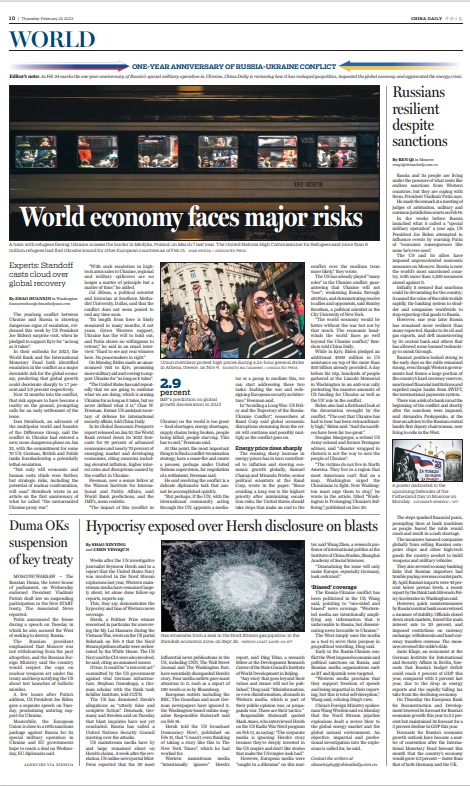
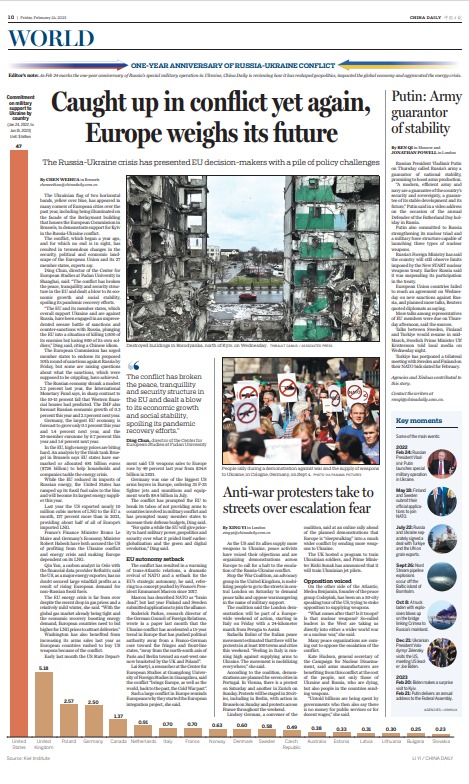
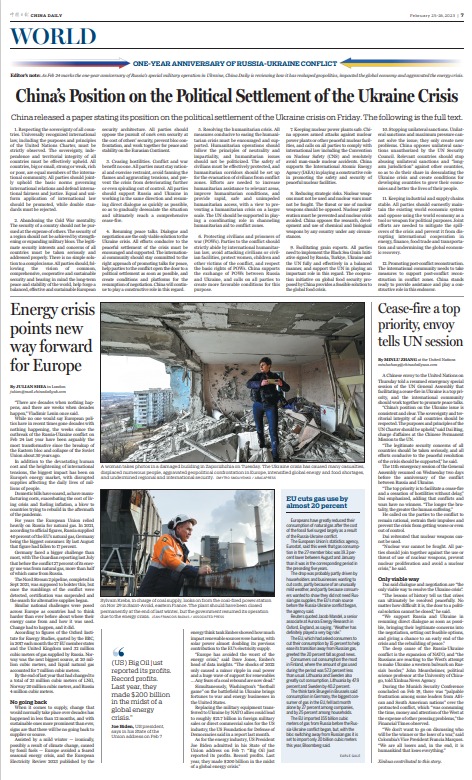
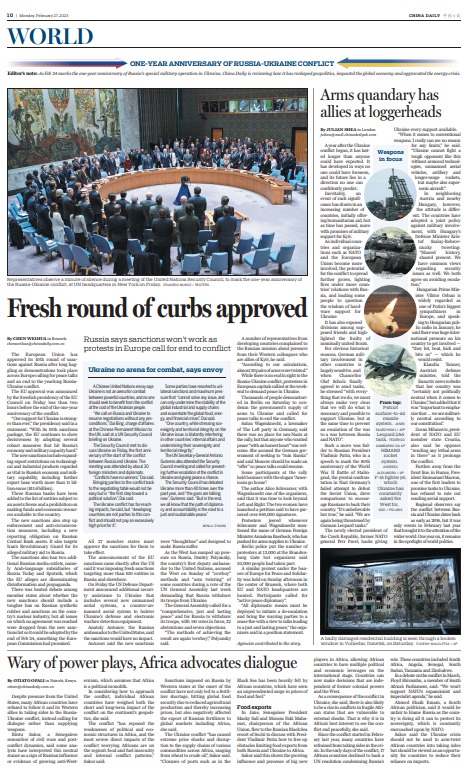
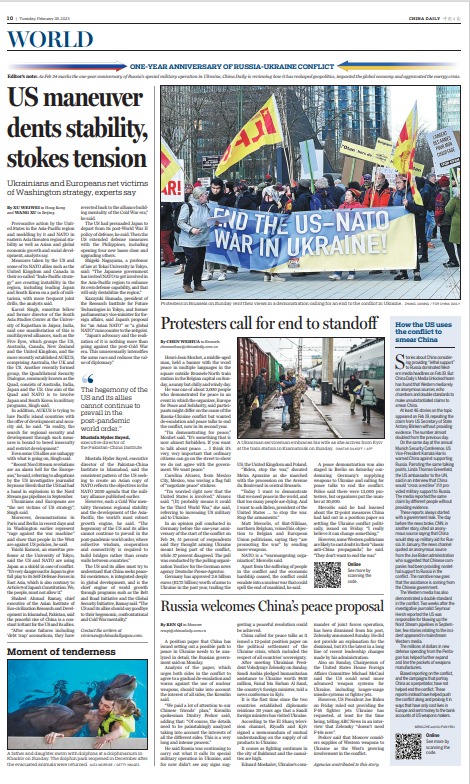

Henri-Jean Moxhet, a middle-aged man, held a banner with the word peace in multiple languages in the square outside Brussels-North train station in the Belgian capital on Sunday, a sunny but chilly and windy day.
He was one of about 2,000 people who demonstrated for peace in an event in which the organizer, Europe for Peace and Solidarity, said participants might differ on the cause of the Russia-Ukraine conflict but wanted de-escalation and peace talks to end the conflict, now in its second year.
"I'm demonstrating for peace," Moxhet said. "It's something that is now almost forbidden. If you want to talk about peace. … I think it's very, very important that ordinary citizens can go on the street to show we do not agree with the government. We want peace."
Carolina Alvarez, from Mexico City, Mexico, was waving a flag full of "negotiate peace" stickers.
"I'm worried right now that the United States is involved," Alvarez said. " (It) probably means it could be the Third World War," she said, referring to increasing US military aid to Ukraine.
In an opinion poll conducted in Germany before the one-year anniversary of the start of the conflict on Feb 24, 51 percent of respondents said they thought arming Ukraine meant being part of the conflict, while 37 percent disagreed. The poll was conducted by the polling organization YouGov for the German news agency Deutsche Presse-Agentur.
Germany has approved 2.6 billion euros ($2.75 billion) worth of arms to Ukraine in the past year, trailing the US, the United Kingdom and Poland.
"Biden, stop the war," shouted Melra Apraxine as she marched with the procession on the Avenue du Boulevard in central Brussels.
"Today I want to demonstrate that we need peace in the world, and that too many people are dying. And I want to ask Biden, president of the United States … to stop the war. Stop the armaments."
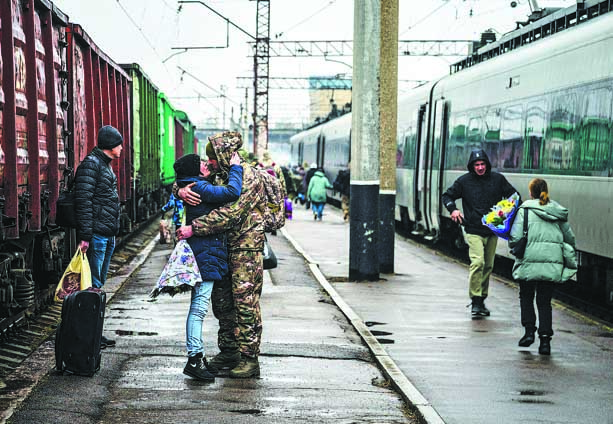
Matt Mercelis, of Sint-Niklaas, northern Belgium, voiced his objection to Belgian and European Union politicians, saying they "are promoting the war" by sending more weapons.
NATO is a "warmongering organization", Mercelis said.
Apart from the suffering of people in the conflict and the economic hardship caused, the conflict could escalate into a nuclear war that could spell the end of mankind, he said.
A peace demonstration was also staged in Berlin on Saturday condemning Germany's supplying weapons to Ukraine and calling for peace talks to end the conflict. Police said there were 13,000 protesters, but organizers put the number at 50,000.
Mercelis said he had learned about the 12-point measures China had laid out in a position paper on settling the Ukraine conflict politically, issued on Friday. "I really believe it can change something."
However, some Western politicians are likely to cast doubt in their "classic anti-China propaganda", he said. "They don't want to end the war."
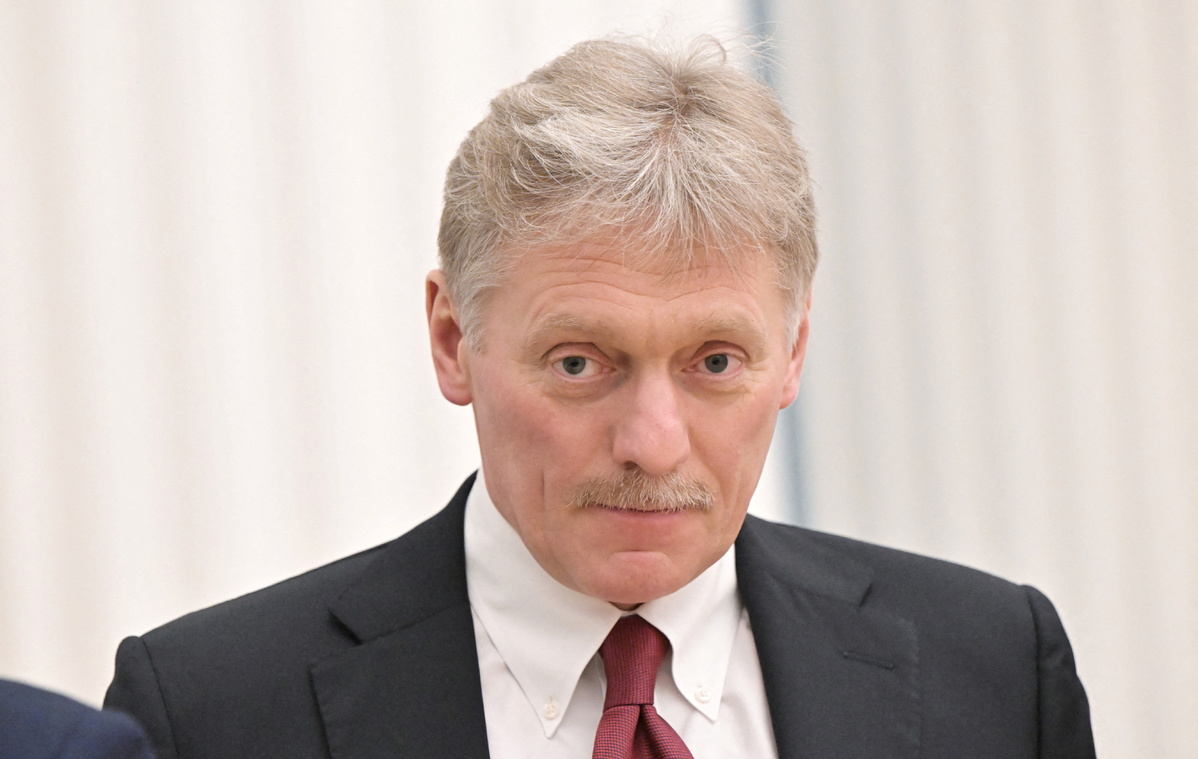
A position paper that China has issued setting out a possible path to peace in Ukraine needs to be analyzed in detail, the Russian government said on Monday.
Analysis of the paper, which urges both sides in the conflict to agree to a gradual de-escalation and warns against the use of nuclear weapons, should take into account the interest of all sides, the Kremlin said.
"We paid a lot of attention to our Chinese friends' plan," Kremlin spokesman Dmitry Peskov said, adding that: "Of course, the details need to be painstakingly analyzed taking into account the interests of all the different sides. This is a very long and intense process."
He said Russia was continuing to carry out what it calls its special military operation in Ukraine, and for now didn't see any signs suggesting a peaceful resolution could be achieved.
China called for peace talks as it issued a 12-point position paper on the political settlement of the Ukraine crisis, which included the respect of all countries' sovereignty.
After meeting Ukrainian President Volodymyr Zelensky on Sunday, Saudi Arabia pledged humanitarian assistance to Ukraine worth $410 million, Faisal bin Farhan Al Saud, the country's foreign minister, told a news conference in Kyiv.
It is the first time since the two countries established diplomatic relations 30 years ago that a Saudi foreign minister has visited Ukraine.
According to the El Sharq television channel, Riyadh and Kyiv signed a memorandum of mutual understanding on the supply of oil products to Ukraine.
It comes as fighting continues in the city of Bakhmut and the casualties are high.
Eduard Moskalov, Ukraine's commander of joint forces operation, has been dismissed from his post, Zelensky announced Sunday. He did not provide an explanation for the dismissal, but it's the latest in a long line of recent leadership changes made by his administration.
Also on Sunday, Chairperson of the United States House Foreign Affairs Committee Michael McCaul said the US could send more advanced weapon systems for Ukraine, including longer-range missile systems or fighter jets.
However, US President Joe Biden on Friday ruled out providing the F-16 fighter jets Ukraine has requested, at least for the time being, telling ABC News in an interview that Zelensky "doesn't need F-16s now".
Peskov said that Moscow considers supplies of Western weapons to Ukraine as the West's growing involvement in the conflict.
Agencies contributed to this story.
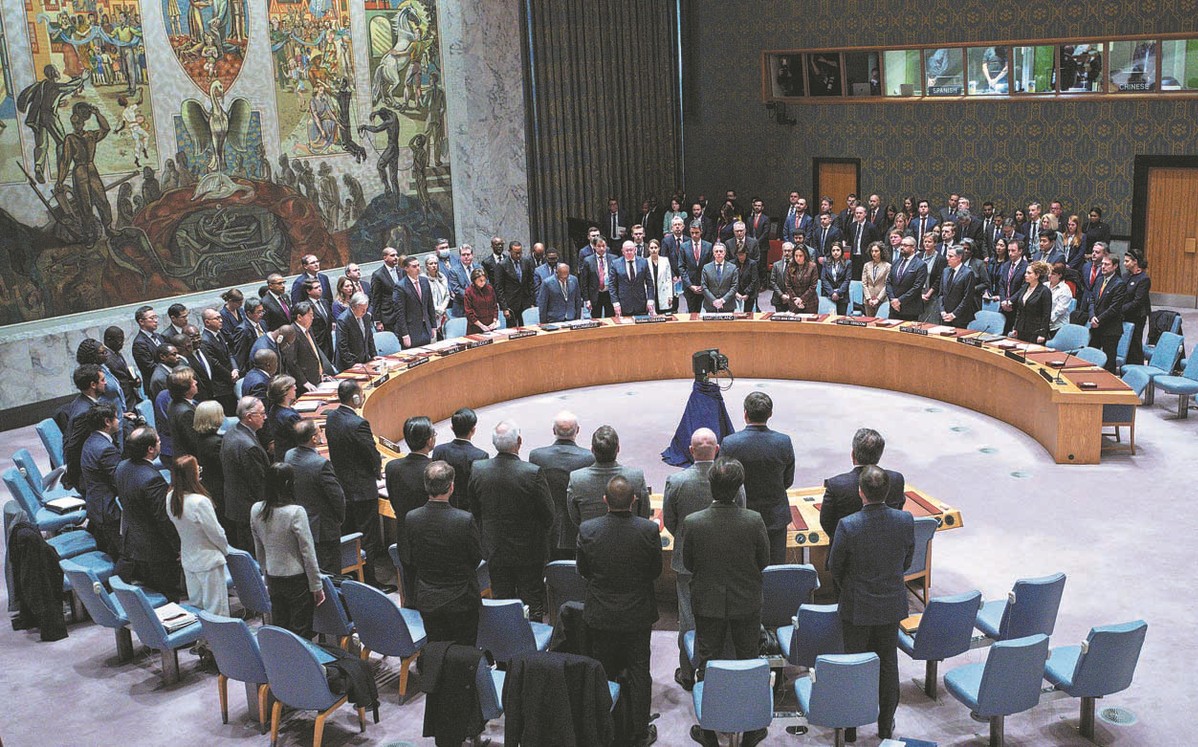
Russia says sanctions won't work as protests in Europe call for end to conflict
The European Union has approved its 10th round of sanctions against Russia after long haggling as demonstrations took place across Europe calling for peace talks and an end to the yearlong Russia-Ukraine conflict.
The EU approval was announced by the Swedish presidency of the EU Council on Friday less than two hours before the end of the one-year anniversary of the conflict.
"Our support for Ukraine is stronger than ever," the presidency said in a statement. "With its 10th sanctions package, the EU continues to show decisiveness by adopting several robust measures that hit Russia's economy and military capacity hard."
The new sanctions include expanding export restrictions on technological and industrial products regarded as vital to Russia's economy and military capability, including further export bans worth more than 11 billion euros ($11.6 billion).
Three Russian banks have been added to the list of entities subject to an assets freeze and a prohibition on making funds and economic resources available to the country.
The new sanctions also step up enforcement and anti-circumvention measures, including a new reporting obligation on Russian Central Bank assets. It also targets Iran's Revolutionary Guard for its alleged military aid to Russia.
The sanctions also ban two additional Russian media outlets, namely Arab-language subsidiaries of Russia Today and Sputnik, which the EU alleges are disseminating disinformation and propaganda.
There was heated debate among member states about whether the new sanctions should include a tougher ban on Russian synthetic rubber and sanctions on the country's nuclear industry, but all issues on which no agreement was reached were dropped from the new sanctions list so it could be adopted by the end of Feb 24, something the European Commission had promised.
All 27 member states must approve the sanctions for them to take effect.
The announcement of the EU sanctions came shortly after the US said it was imposing fresh sanctions targeting more than 100 entities in Russia and elsewhere.
On Friday the US Defense Department announced additional security assistance to Ukraine that includes several new unmanned aerial systems, a counter-unmanned aerial system to bolster Ukraine's defense and electronic warfare detection equipment.
Anatoly Antonov, the Russian ambassador to the United States, said the sanctions would have no impact.
Antonov said the new sanctions were "thoughtless" and designed to make Russia suffer.
As the West has ramped up pressure on Russia, Dmitry Polyansky, the country's first deputy ambassador to the United Nations, accused the West on Sunday of "cowboy" methods and "arm twisting" of some countries during a vote of the UN General Assembly last week demanding that Russia withdraw its troops from Ukraine.
The General Assembly called for a "comprehensive, just and lasting peace" and for Russia to withdraw its troops, with 141 votes in favor, 32 abstentions and seven objections.
"The methods of achieving the result are again 'cowboy'," Polyansky said.
A number of representatives from developing countries complained to the Russian mission about pressure from their Western colleagues who are allies of Kyiv, he said.
"According to our calculations, almost 30 pairs of arms were twisted."
While there is no end in sight to the Russia-Ukraine conflict, protesters in European capitals rallied at the weekend to demand peace in Ukraine.
Thousands of people demonstrated in Berlin on Saturday to condemn the government's supply of arms to Ukraine and called for peace talks to end the conflict.
Sahra Wagenknecht, a lawmaker of The Left party in Germany, said there was no place for neo-Nazis at the rally, but that anyone who wanted peace "with an honest heart" was welcome. She accused the German government of seeking to "ruin Russia" and said Moscow should be made an "offer" so peace talks could resume.
Some participants at the rally held banners with the slogan "Americans go home".
The author Alice Schwarzer, with Wagenknecht one of the organizers, said that it was time to look beyond Left and Right. The two women have launched a petition said to have garnered over 645,000 signatures.
Protesters jeered whenever Schwarzer and Wagenknecht mentioned the name of German Foreign Minister Annalena Baerbock, who has pushed for arms supplies to Ukraine.
Berlin police put the number of protesters at 13,000 at the Brandenburg Gate but organizers said 50,000 people had taken part.
A similar protest under the banner of Europe for Peace and Solidarity was held on Sunday afternoon in the center of Brussels, where both EU and NATO headquarters are located. Participants called for "active peace diplomacy".
"All diplomatic means must be deployed to initiate a de-escalation and bring the warring parties to a cease-fire with a view to talks leading to a just and lasting peace," the organizers said in a position statement.
Agencies contributed to the story.
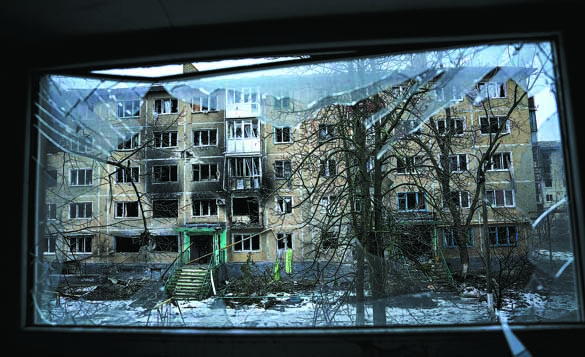
A year after the Ukraine conflict began, it has lasted longer than anyone could have expected. It has developed in ways no one could have foreseen, and its future lies in a direction no one can confidently predict.
Inevitably, an event of such significance has drawn in an increasing number of countries, initially offering humanitarian aid, but as time has passed, more with promises of military support for Kyiv.
As individual countries and organizations such as NATO and the European Union become more involved, the potential for the conflict to spread further grows, lighting fires under more countries' relations with Russia, and leading some people to question the wisdom of hardware support for Ukraine.
It has also exposed divisions among supposed friends and highlighted the frailty of nominally united fronts.
For obvious historical reasons, German military involvement in other countries is hugely sensitive, and when Chancellor Olaf Scholz finally agreed to send tanks, he stressed "with everything that we do, we must always make very clear that we will do what is necessary and possible to support Ukraine, but at the same time to prevent an escalation of the war to a war between Russia and NATO".
Such a move was fodder to Russian President Vladimir Putin, who in a speech to mark the 80th anniversary of the World War II Battle of Stalingrad, the pivotal confrontation in Nazi Germany's failed attempt to defeat the Soviet Union, drew comparisons to encourage Russians to back their country. "It's unbelievable but true," he said. "We are again being threatened by German Leopard tanks."
The newly elected president of the Czech Republic, former NATO general Petr Pavel, backs giving Ukraine every support available.
"When it comes to conventional weapons, I really can see no reason for any limits," he said. "Ukraine cannot fight a tough opponent like this without armored technologies, unmanned aerial vehicles, artillery and longer-range rockets, but maybe also supersonic aircraft."
In neighboring Austria and nearby Hungary, however, the attitude is different. The countries have adopted a joint policy against military involvement, with Hungary's Defense Minister Kristof Szalay-Bobrovniczky tweeting: "Shared history, shared present. We have common views regarding security issues as well. We both agree on avoiding escalation."
Hungarian Prime Minister Viktor Orban is widely regarded as one of Putin's biggest sympathizers in Europe, and speaking to Hungarian public radio in January, he said there was huge international pressure on his country to get involved — "they hit, beat, kick and bite us" — which he would resist.
Klaudia Tanner, Austria's defense minister, told the Euractiv news website that her country was "certainly not politically neutral when it comes to Ukraine", but added that it was "important to emphasize that… we are militarily neutral according to our constitution".
Zoran Milanovic, president of NATO and EU member state Croatia, also said he opposes "sending any lethal arms in there" as it prolongs the conflict.
Further away from the front line, in France, President Emmanuel Macron, one of the first leaders to promise tanks to Ukraine, has refused to rule out sending aerial support.
Regional observers say the conflict between Russia and Ukraine dates back as early as 2014, but it was only events in February last year that brought it to the attention of the wider world. One year on, it remains in the spotlight of world politics.
Despite pressure from the United States, many African countries have refused to follow it and its Western allies in taking sides in the Russia-Ukraine conflict, instead calling for dialogue rather than supplying weapons.
Bintu Sakor, a Senegalese researcher of civil wars and post-conflict dynamics, said some analysts have interpreted this neutral stance as a sign of Russian influence or evidence of growing anti-Westernism, which assumes that Africa is a political monolith.
In considering how to approach the conflict, individual African countries have weighed both the short and long-term impact of the conflict on the continent's geopolitics, she said.
The conflict "has exposed the weaknesses of political and economic structures in Africa, and the most severe direct impacts of the conflict worrying Africans are on the region's food and fuel insecurity and internal conflict patterns," Sakor said.
Sanctions imposed on Russia by Western states at the onset of the conflict have not only led to a fertilizer shortage, hitting global food security due to reduced agricultural production and thereby increasing prices, but also negatively affected the export of Russian fertilizers to global markets including Africa, she said.
The Ukraine conflict "has caused extreme price shocks and disruption to the supply chains of various commodities across Africa, ranging from wheat to crude oil", Sakor said. "Closures of ports such as in the Black Sea has been heavily felt by African countries, which have seen an unprecedented surge in prices of food and fuel."
Food exports
In June, Senegalese President Macky Sall and Moussa Faki Mahamat, chairperson of the African Union, flew to the Russian Black Sea resort of Sochi to discuss with President Vladimir Putin how to free up obstacles limiting food exports from both Russia and Ukraine to Africa.
Sakor said this shows the growing influence and presence of big new players in Africa, allowing African countries to have multiple political and economic leverages on the international stage. Countries can now make decisions that are independent of former colonial powers and the West.
As a consequence of the conflict in Ukraine, she said, there is also likely to be a rise in conflicts in fragile African states that are vulnerable to external shocks. That is why it is in Africa's best interest to see the conflict end peacefully, she said.
Since the conflict started in February last year, many countries have refrained from taking sides in the crisis. In the early days of the conflict, 17 African countries declined to back a UN resolution condemning Russia's role. These countries included South Africa, Angola, Senegal, South Sudan, Tanzania and Zimbabwe.
In a debate on the conflict in March, Floyd Shivambu, a member of South Africa's Parliament, said: "We won't support NATO's expansionist and imperialist agenda," he said.
Ahmed Shaik Emam, a South African politician, said it would be unfair to blame Russia as the country is doing all it can to protect its sovereignty, which is constantly encroached upon by NATO.
Sakor said the Ukraine crisis should not be used to arm-twist African countries into taking sides but should be viewed as an opportunity for countries to reduce their reliance on imports.
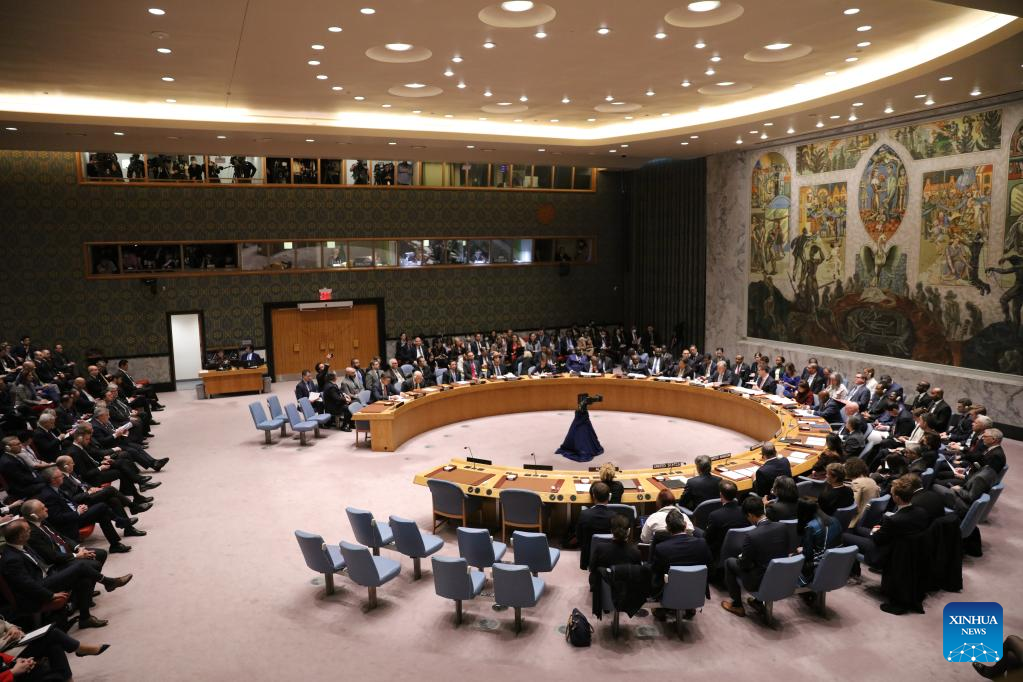
A Chinese envoy to the United Nations emphasized on Friday that Ukraine is not an arena for fights between major countries, and no one should seek to benefit from the conflict at the cost of the Ukrainian people.
"We call on Russia and Ukraine to resume negotiations without any preconditions," Dai Bing, charge d'affaires at the Chinese Permanent Mission to the UN, said at the UN Security Council Briefing on Ukraine.
The UN Security Council held a high-level meeting on Ukraine on Friday to mark the first anniversary of the conflict between Russia and Ukraine. The meeting was attended by about 30 foreign ministers and diplomats.
"Conflicts have no winners," said Dai. "Launching diplomatic negotiations is the only right way to solve the Ukraine crisis. The international community should promote peace talks with the highest sense of urgency and work to create enabling factors and platforms for the resumption of negotiation," he said.
Dai said that bringing parties to the conflict back to the negotiating table is not going to be easy, but it is "the first step toward a political solution".
He noted that the Ukraine crisis has far-reaching impacts, but "developing countries are not parties to this conflict and should not pay an excessively high price for it."
Some relevant parties have been resorting to unilateral sanctions and maximum pressure, which "cannot solve any issue, and can only undermine the stability of the global industrial and supply chains and exacerbate the global food, energy, and financial crises," the envoy said.
"We hope that the relevant parties will take responsible actions and stop abusing unilateral sanctions and long-arm jurisdiction," said Dai.
Observing universally recognized international law and the basic norms governing international relations bears on the stability of the international system and international fairness and justice. They should be equally and uniformly applied in every place and on every issue without exception, said Dai.
"Some country, while stressing sovereignty and territorial integrity on the Ukraine issue, is blatantly interfering in other countries' internal affairs and undermining their sovereignty and territorial integrity. This reveals its double standard at full display. The international community is clear-eyed about this," he added.
Dai reiterated that the security of one country should not be pursued at the expense of others. Strengthening or even expanding military blocs will only undermine regional security and will never bring about peace.
He said Russia, Ukraine, and European countries are neighbors that cannot be physically moved away. "To realize lasting peace and stability in Europe, the Cold War mentality and bloc confrontation must be abandoned, and the legitimate security concerns of all countries must be taken seriously and addressed properly, so as to build a balanced, effective, and sustainable regional security architecture," he said.
"Nuclear weapons must never be used, and nuclear war must never be fought. Faced with the risk that the Ukraine crisis could lead to an escalation of the conflict, major countries bear special and important responsibilities to maintain communication and coordination and to do everything they can to prevent a nuclear crisis."
Dai pointed out that the humanitarian crisis in Ukraine is worsening and should be proactively and properly addressed.
"Relevant parties should avoid attacking civilians or civilian facilities, protect the vulnerable, including women and children, ensure humanitarian access, and respect the basic rights of prisoners of war. The international community should increase humanitarian assistance, help restore civilian infrastructure, and ensure the basic livelihood of refugees and displaced persons, with a view to preventing a humanitarian crisis on a larger scale," he said.
The humanitarian operations should earnestly follow the principles of neutrality and impartiality and avoid politicization, he added.
UN Secretary-General Antonio Guterres also attended the Security Council meeting on Friday and called for preventing further escalation of the conflict in Ukraine and giving peace "a chance".
Guterres said the Security Council has held more than 40 debates on Ukraine over the past year, and "the guns are talking now, but in the end we all know that the path of diplomacy and accountability is the road to a just and sustainable peace," he said.
China also released a paper on Friday stating its position on the political settlement of the Ukraine crisis, stating that dialogue and negotiation are the only viable solution to the Ukraine crisis.
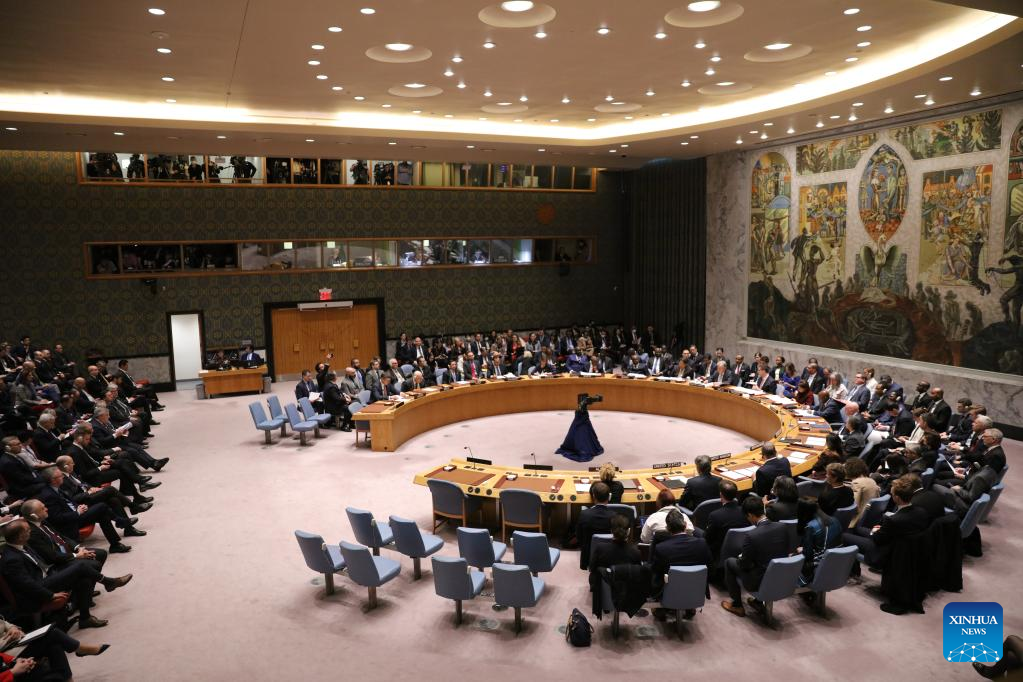
A Chinese envoy to the United Nations on Thursday told a resumed emergency special session of the UN General Assembly that facilitating a cease-fire in Ukraine is a top priority, and the international community should work together to promote peace talks.
"China's position on the Ukraine issue is consistent and clear. The sovereignty and territorial integrity of all countries should be respected. The purposes and principles of the UN Charter should be upheld," said Dai Bing, charge d'affaires at the Chinese Permanent Mission to the UN.
"The legitimate security concerns of all countries should be taken seriously, and all efforts conducive to the peaceful resolution of the crisis should be supported," he said.
The 11th emergency session of the General Assembly resumed on Wednesday two days before the anniversary of the conflict between Russia and Ukraine.
"The top priority is to facilitate a cease-fire and a cessation of hostilities without delay," Dai emphasized, adding that conflicts and wars have no winners. "The longer the brutality, the greater the human suffering."
He called on the parties to the conflict to remain rational, restrain their impulses and prevent the crisis from getting worse or even out of control.
Dai reiterated that nuclear weapons cannot be used.
"Nuclear war cannot be fought. All parties should join together against the use or threat of use of nuclear weapons, prevent nuclear proliferation and avoid a nuclear crisis," he said.
Only viable way
Dai said dialogue and negotiation are "the only viable way to resolve the Ukraine crisis".
"The lessons of history tell us that crises can ultimately be resolved peacefully. No matter how difficult it is, the door to a political solution cannot be closed," he said.
"We support Russia and Ukraine in resuming direct dialogue as soon as possible, bringing their legitimate concerns into the negotiation, setting out feasible options, and giving a chance to an early end of the crisis and the rebuilding of peace."
The deep cause of the Russia-Ukraine conflict is the expansion of NATO, and "the Russians are reacting to the West's attempt to make Ukraine a western bulwark on Russia's border," John Mearsheimer, political science professor at the University of Chicago, told Xinhua News Agency.
During the Munich Security Conference concluded on Feb 19, there was "palpable frustration among some leaders from African and South American nations" over the protracted conflict, which "was consuming the time, money and attention of the West at the expense of other pressing problems," the Financial Times observed.
"We don't want to go on discussing who will be the winner or the loser of a war," said Colombia's Vice President Francia Marquez."We are all losers and, in the end, it is humankind that loses everything."
Xinhua contributed to this story.
minluzhang@chinadailyusa.com
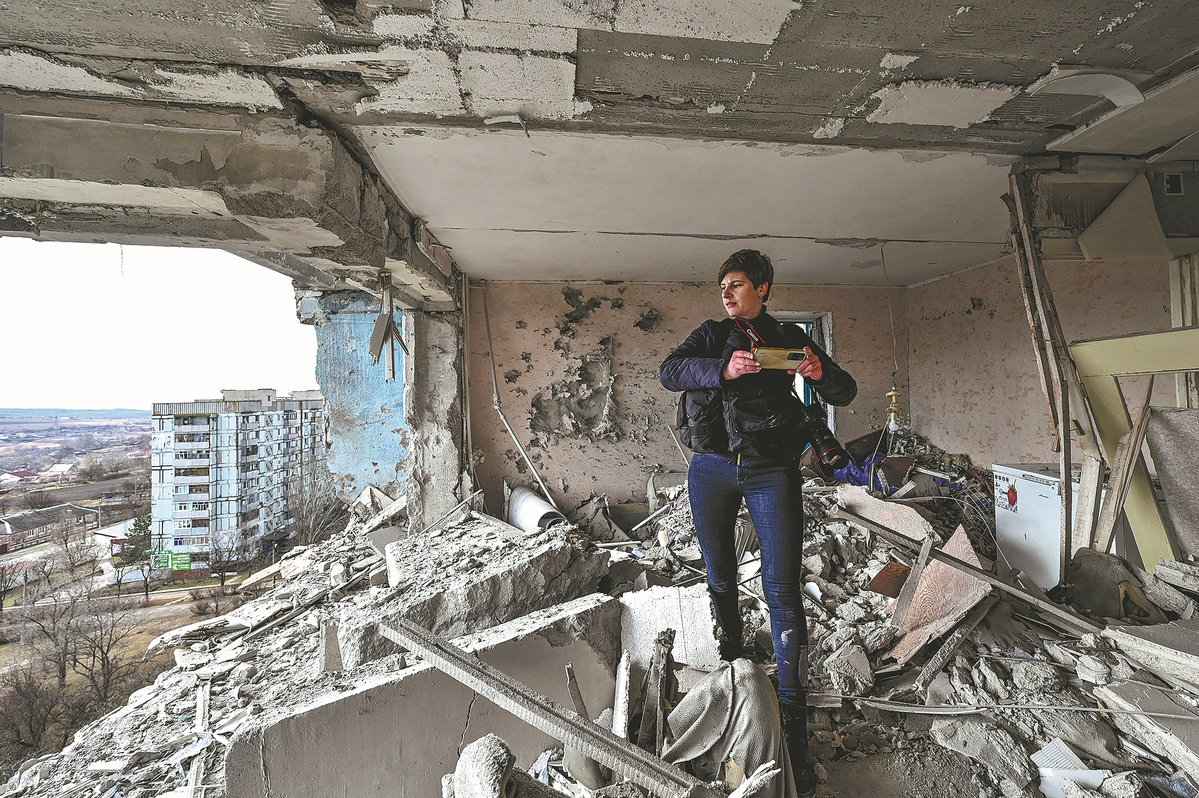
"There are decades when nothing happens, and there are weeks when decades happen," Vladimir Lenin once said.
While no one would say European politics have in recent times gone decades with nothing happening, the weeks since the outbreak of the Russia-Ukraine conflict on Feb 24 last year have been arguably the most transformative since the breakup of the Eastern bloc and collapse of the Soviet Union about 30 years ago.
In addition to the devastating human cost and the heightening of international tensions, the biggest impact has been on Europe's energy market, with disrupted supplies affecting the daily lives of millions of people.
Domestic bills have soared, as have manufacturing costs, exacerbating the cost of living crisis and fueling inflation, a blow to countries trying to rebuild in the aftermath of the pandemic.
For years the European Union relied heavily on Russia for natural gas. In 2021, according to official figures, Russia supplied 40 percent of the EU's natural gas, Germany being the biggest consumer. By last August that figure had fallen to 17 percent.
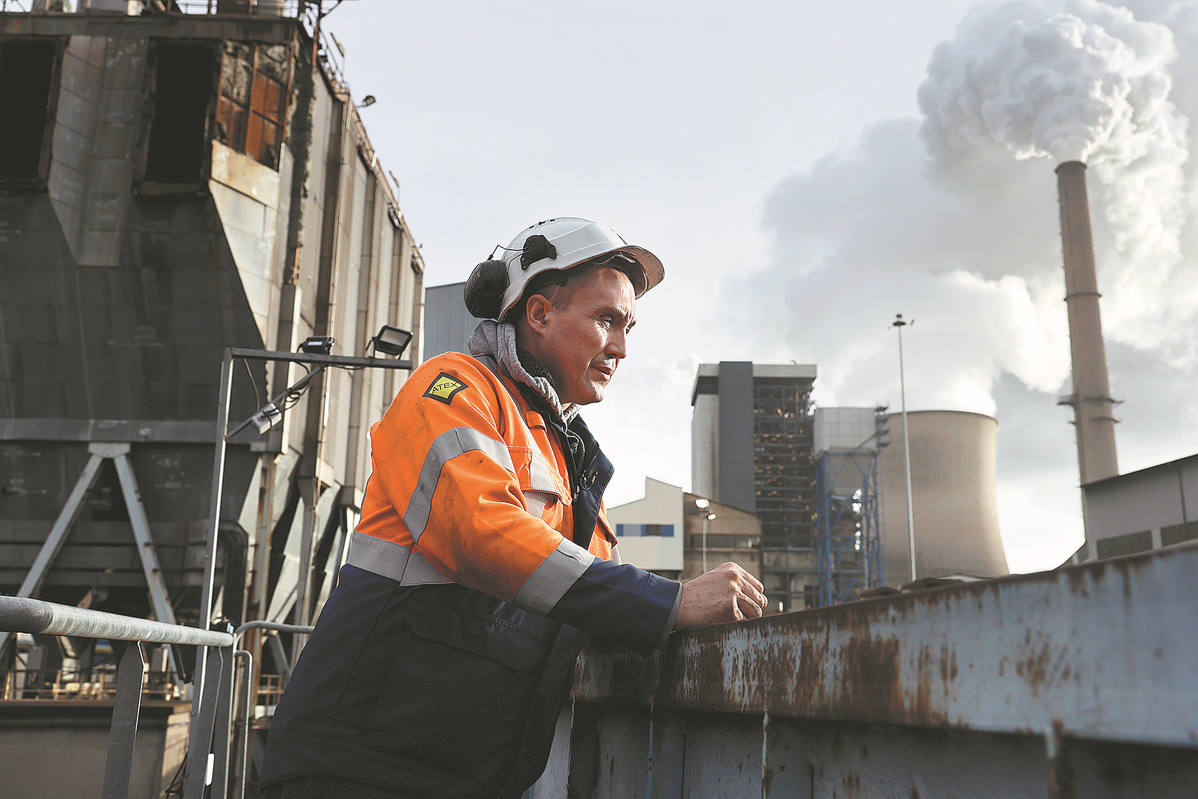
Germany faced a bigger challenge than most, with The Guardian reporting last July that before the conflict 27 percent of its energy use was from natural gas, more than half of which came from Russia.
The Nord Stream 2 pipeline, completed in Sept 2021, was supposed to bolster this, but once the rumblings of the conflict were detected, certification was suspended and the search for alternative supplies began.
Similar national challenges were posed across Europe as countries had to think harder than ever before about where their energy came from and how it was used. Change had to happen, and it did.
According to figures of the Oxford Institute for Energy Studies, quoted by the BBC, in 2017 each month the 27 EU member states and the United Kingdom used 32 million cubic meters of gas supplied by Russia. Norway was the next biggest source, at 20 million cubic meters, and liquid natural gas accounted for 7 million cubic meters.
By the end of last year that had changed to a total of 25 million cubic meters of LNG, Norway 20 million cubic meters, and Russia 4 million cubic meters.
No going back
When it comes to supply, change that would normally take place over decades has happened in less than 12 months, and with sustainable ones more prominent than ever, signs are that there will be no going back to supplier or source.
Assisted by a mild winter — ironically, possibly a result of climate change, caused by fossil fuels — Europe avoided a feared seasonal energy crisis, and the European Electricity Review 2023 published by the energy think tank Ember showed how much impact renewable sources were having, with solar power almost doubling its previous contribution to the EU's electricity supply.
"Europe has avoided the worst of the energy crisis," said Dave Jones, Ember's head of data insights. "The shocks of 2022 only caused a minor ripple in coal power and a huge wave of support for renewables… Any fears of a coal rebound are now dead."
Simultaneously, Washington's "football game" on the battlefield in Ukraine brings fortunes to war and energy businesses in the United States.
Replacing the military equipment transferred to Ukraine by NATO allies could lead to roughly $21.7 billion in foreign military sales or direct commercial sales for the US industry, the US Foundation for Defense of Democracies said in a report last month.
As for the energy industry, US President Joe Biden admitted in his State of the Union address on Feb 7: "Big Oil just reported its profits. Record profits. Last year, they made $200 billion in the midst of a global energy crisis."
julian@mail.chinadailyuk.com
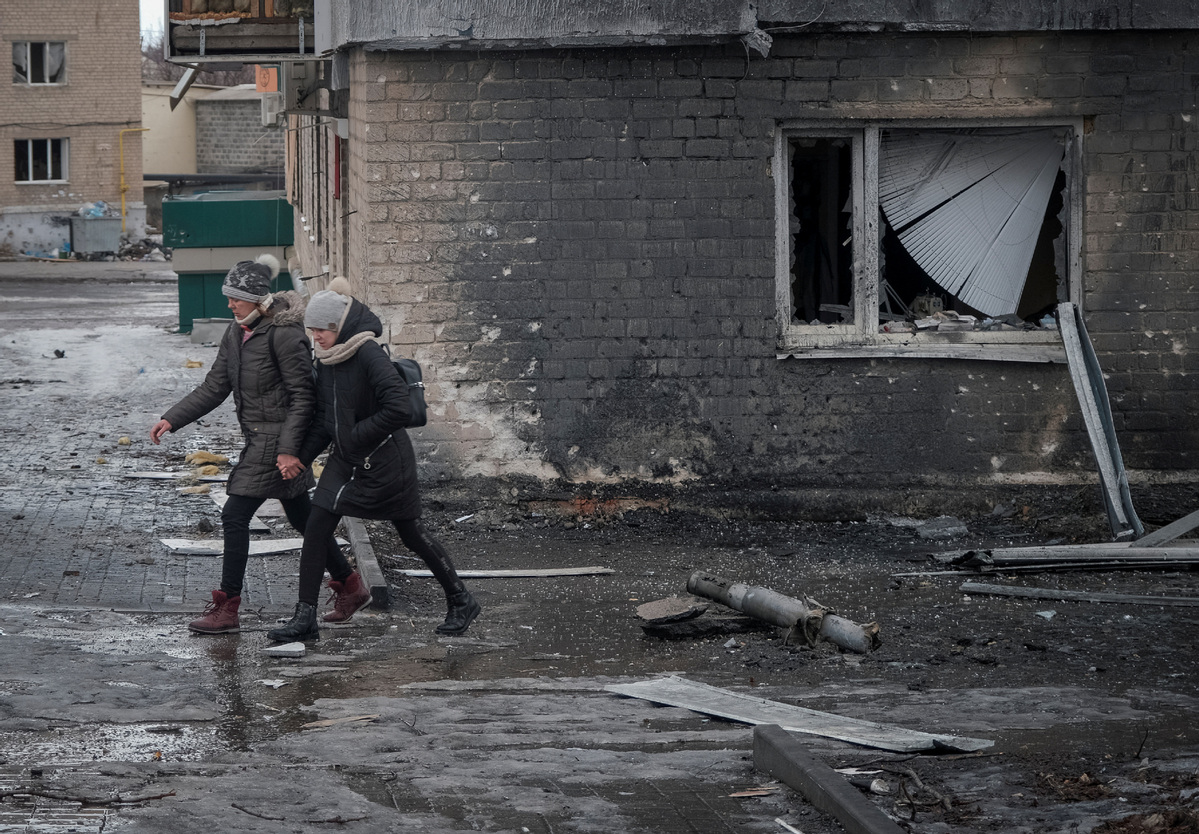
China released a paper stating its position on the political settlement of the Ukraine crisis on Friday. The following is the full text.
1. Respecting the sovereignty of all countries. Universally recognized international law, including the purposes and principles of the United Nations Charter, must be strictly observed. The sovereignty, independence and territorial integrity of all countries must be effectively upheld. All countries, big or small, strong or weak, rich or poor, are equal members of the international community. All parties should jointly uphold the basic norms governing international relations and defend international fairness and justice. Equal and uniform application of international law should be promoted, while double standards must be rejected.
2. Abandoning the Cold War mentality. The security of a country should not be pursued at the expense of others. The security of a region should not be achieved by strengthening or expanding military blocs. The legitimate security interests and concerns of all countries must be taken seriously and addressed properly. There is no simple solution to a complex issue. All parties should, following the vision of common, comprehensive, cooperative and sustainable security and bearing in mind the long-term peace and stability of the world, help forge a balanced, effective and sustainable European security architecture. All parties should oppose the pursuit of one's own security at the cost of others' security, prevent bloc confrontation, and work together for peace and stability on the Eurasian Continent.
3. Ceasing hostilities. Conflict and war benefit no one. All parties must stay rational and exercise restraint, avoid fanning the flames and aggravating tensions, and prevent the crisis from deteriorating further or even spiraling out of control. All parties should support Russia and Ukraine in working in the same direction and resuming direct dialogue as quickly as possible, so as to gradually deescalate the situation and ultimately reach a comprehensive cease-fire.
4. Resuming peace talks. Dialogue and negotiation are the only viable solution to the Ukraine crisis. All efforts conducive to the peaceful settlement of the crisis must be encouraged and supported. The international community should stay committed to the right approach of promoting talks for peace, help parties to the conflict open the door to a political settlement as soon as possible, and create conditions and platforms for the resumption of negotiation. China will continue to play a constructive role in this regard.
5. Resolving the humanitarian crisis. All measures conducive to easing the humanitarian crisis must be encouraged and supported. Humanitarian operations should follow the principles of neutrality and impartiality, and humanitarian issues should not be politicized. The safety of civilians must be effectively protected, and humanitarian corridors should be set up for the evacuation of civilians from conflict zones. Efforts are needed to increase humanitarian assistance to relevant areas, improve humanitarian conditions, and provide rapid, safe and unimpeded humanitarian access, with a view to preventing a humanitarian crisis on a larger scale. The UN should be supported in playing a coordinating role in channeling humanitarian aid to conflict zones.
6. Protecting civilians and prisoners of war (POWs). Parties to the conflict should strictly abide by international humanitarian law, avoid attacking civilians or civilian facilities, protect women, children and other victims of the conflict, and respect the basic rights of POWs. China supports the exchange of POWs between Russia and Ukraine, and calls on all parties to create more favorable conditions for this purpose.
7. Keeping nuclear power plants safe. China opposes armed attacks against nuclear power plants or other peaceful nuclear facilities, and calls on all parties to comply with international law including the Convention on Nuclear Safety (CNS) and resolutely avoid man-made nuclear accidents. China supports the International Atomic Energy Agency (IAEA) in playing a constructive role in promoting the safety and security of peaceful nuclear facilities.
8. Reducing strategic risks. Nuclear weapons must not be used and nuclear wars must not be fought. The threat or use of nuclear weapons should be opposed. Nuclear proliferation must be prevented and nuclear crisis avoided. China opposes the research, development and use of chemical and biological weapons by any country under any circumstances.
9. Facilitating grain exports. All parties need to implement the Black Sea Grain Initiative signed by Russia, Turkiye, Ukraine and the UN fully and effectively in a balanced manner, and support the UN in playing an important role in this regard. The cooperation initiative on global food security proposed by China provides a feasible solution to the global food crisis.
10. Stopping unilateral sanctions. Unilateral sanctions and maximum pressure cannot solve the issue; they only create new problems. China opposes unilateral sanctions unauthorized by the UN Security Council. Relevant countries should stop abusing unilateral sanctions and "longarm jurisdiction" against other countries, so as to do their share in deescalating the Ukraine crisis and create conditions for developing countries to grow their economies and better the lives of their people.
11. Keeping industrial and supply chains stable. All parties should earnestly maintain the existing world economic system and oppose using the world economy as a tool or weapon for political purposes. Joint efforts are needed to mitigate the spillovers of the crisis and prevent it from disrupting international cooperation in energy, finance, food trade and transportation and undermining the global economic recovery.
12. Promoting post-conflict reconstruction. The international community needs to take measures to support post-conflict reconstruction in conflict zones. China stands ready to provide assistance and play a constructive role in this endeavor.
The Russia-Ukraine crisis has presented EU decision-makers with a pile of policy challenges
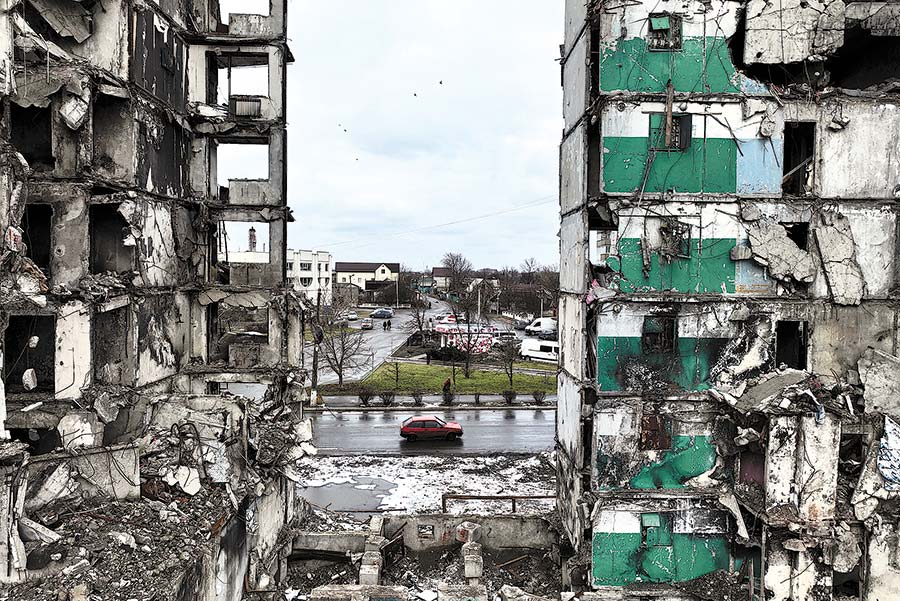
The Ukrainian flag of two horizontal bands, yellow over blue, has appeared in many corners of European cities over the past year, including being illuminated on the facade of the Berlaymont building that houses the European Commission in Brussels, to demonstrate support for Kyiv in the Russia-Ukraine conflict.
The conflict, which began a year ago, and for which no end is in sight, has resulted in tremendous changes in the security, political and economic landscape of the European Union and its 27 member states, experts say.
Ding Chun, director of the Center for European Studies at Fudan University in Shanghai, said: "The conflict has broken the peace, tranquillity and security structure in the EU and dealt a blow to its economic growth and social stability, spoiling its pandemic recovery efforts.
"The EU and its member states, which overall support Ukraine and are against Russia, have been engaged in an unprecedented seesaw battle of sanctions and counter-sanctions with Russia, plunging the EU into a situation of killing 1,000 of its enemies but losing 800 of its own soldiers," Ding said, citing a Chinese idiom.
The European Commission has urged member states to endorse its proposed 10th round of sanctions against Russia by Friday, but some are raising questions about what the sanctions, which were supposed to be crippling, have achieved.
The Russian economy shrank a modest 2.2 percent last year, the International Monetary Fund says, in sharp contrast to the 10-15 percent fall that Western financial houses had predicted. The IMF also forecast Russian economic growth of 0.3 percent this year and 2.1 percent next year.
Germany, the largest EU economy, is forecast to grow only 0.1 percent this year and 1.4 percent next year, and the 20-member eurozone by 0.7 percent this year and 1.6 percent next year.
In the EU, high energy prices are biting hard. An analysis by the think tank Bruegel in Brussels says EU states have earmarked or allocated 681 billion euros ($726 billion) to help households and companies tackle the energy crisis.
While the EU reduced its imports of Russian energy, the United States has ramped up its fossil fuel sales to the bloc and will become its largest energy supplier this year.
Last year the US exported nearly 10 million cubic meters of LNG to the EU a month, 137 percent more than in 2021, providing about half of all of Europe's imported LNG.
France's Finance Minister Bruno Le Maire and Germany's Economy Minister Robert Habeck have both accused the US of profiting from the Ukraine conflict and energy crisis and making Europe dependent on its LNG.
Qin Yan, a carbon analyst in Oslo with the financial data provider Refinitiv, said the US, as a major energy exporter, has no doubt secured large windfall profits as a result of rising European demand for non-Russian fossil fuels.
The EU energy crisis is far from over despite the recent drop in gas prices and a relatively mild winter, she said. "With the global gas market already being tight and the economic recovery boosting energy demand, European countries need to bid higher for LNG prices to attract deliveries."
Washington has also benefited from increasing its arms sales last year as European countries rushed to buy US weapons because of the conflict.
Early last month the US State Department said US weapons sales to Europe rose by 49 percent last year from $34.8 billion in 2021.
Germany was one of the biggest US arms buyers in Europe, ordering 35 F-35 fighter jets and munitions and equipment worth $8.4 billion in July.
The conflict has prompted the EU to break its taboo of not providing arms to countries involved in military conflict and has prompted many member states to increase their defense budgets, Ding said.
"For quite a while the EU will give priority to hard military power, geopolitics and security over what it prided itself earlier: globalization and the green and digital revolution," Ding said.
EU autonomy setback
The conflict has resulted in a warming of trans-Atlantic relations, a dramatic revival of NATO and a setback for the EU's strategic autonomy, he said, referring to a concept pushed by France's President Emmanuel Macron since 2017.
Macron has described NATO as "brain dead", but last year Finland and Sweden submitted applications to join the alliance.
Roderick Parkes, research director of the German Council of Foreign Relations, wrote in a paper last month that the Ukraine conflict has accelerated a 15-year trend in Europe that has pushed political authority away from a Franco-German core toward the fringes and front-line states, "away from the north-south axis of Paris and Berlin toward an east-west one now bracketed by the UK and Poland".
Lai Suetyi, a researcher at the Center for European Studies at Guangdong University of Foreign Studies in Guangzhou, said the conflict "brings Europe, as well as the world, back to the past, the Cold War past".
Such a large conflict in Europe reminds Europeans why they started the European integration project, she said.
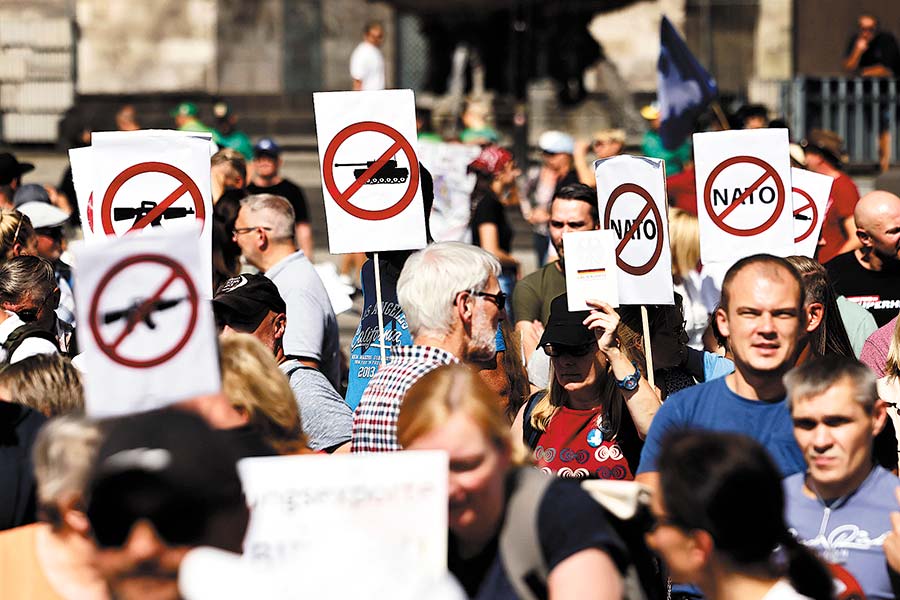
As the US and its allies supply more weapons to Ukraine, peace activists have voiced their objections and are organizing demonstrations across Europe to call for a halt to the escalation of the Russia-Ukraine conflict.
Stop the War Coalition, an advocacy group in the United Kingdom, is mobilizing people to go to the streets in central London on Saturday to demand peace talks and oppose warmongering in the name of military support.
The coalition said the London demonstration will be part of a Europe-wide weekend of action, starting in Italy on Friday with a 24-kilometer march from Perugia to Assisi.
Rafaella Bolini of the Italian peace movement estimated that there will be protests in at least 100 towns and cities this weekend. "Feeling in Italy is running high against supplying arms to Ukraine. The movement is mobilizing everywhere," she said.
According to the coalition, demonstrations are planned for seven cities in Portugal. In Vienna, there is a protest on Saturday and another in Zurich on Sunday. Protests will be staged in 20 cities, including in Berlin, with action in Brussels on Sunday and protests across France throughout the weekend.
Lindsey German, a convener of the coalition, said at an online rally ahead of the planned demonstrations that Europe is "sleepwalking" into a much wider conflict by sending more weapons to Ukraine.
The UK hosted a program to train Ukrainian soldiers, and Prime Minister Rishi Sunak has announced that it will train Ukrainian jet pilots.
Opposition voiced
On the other side of the Atlantic, Medea Benjamin, founder of the peace group Codepink, has been on a 50-city speaking tour of the US, trying to stoke opposition to supplying weapons.
"What comes after that? Is it troops? Is that nuclear weapons? So-called leaders in the West are taking us directly into either a wider world war or a nuclear war," she said.
Many peace organizations are coming out to oppose the escalation of the conflict.
Kate Hudson, general secretary of the Campaign for Nuclear Disarmament, said arms manufacturers are benefiting from this conflict at the cost of the people, not only those of Ukraine and Russia, who are dying, but also people in the countries sending weapons.
"Untold billions are being spent by governments who then also say there is no money for public services or for decent wages," she said.
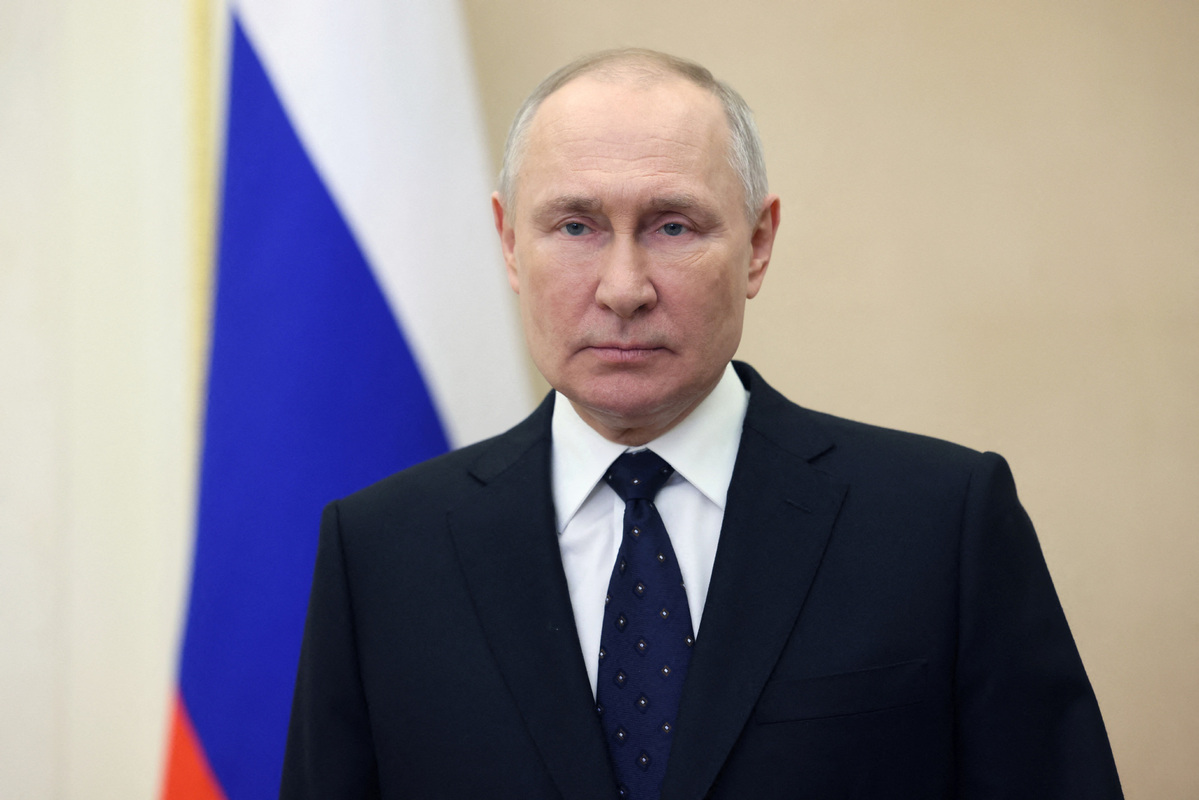
Russian President Vladimir Putin on Thursday called Russia's army a guarantor of national stability, promising to boost arms production.
"A modern, efficient army and navy are a guarantee of the country's security and sovereignty, a guarantee of its stable development and its future," Putin said in a video address on the occasion of the annual Defender of the Fatherland Day holiday in Russia.
Putin also committed to Russia strengthening its nuclear triad and a military force structure capable of launching three types of nuclear weapons.
Russia's Foreign Ministry has said the country will still observe limits imposed by the New START nuclear weapons treaty. Earlier Russia said it was suspending its participation in the treaty.
European Union countries failed to reach an agreement on Wednesday on new sanctions against Russia, and planned more talks, Reuters quoted diplomats as saying.
More talks among representatives of EU members were due on Thursday afternoon, said the sources.
Talks between Sweden, Finland and Turkiye would resume in mid-March, Swedish Prime Minister Ulf Kristersson told local media on Wednesday night.
Turkiye has postponed a trilateral meeting with Sweden and Finland on their NATO bids slated for February.
Agencies and Xinhua contributed to this story.
Editor's note: As the Russia-Ukraine conflict started one year ago, humanitarian crises have occurred in many areas in the world. Many people have been touched by the conflict in varying ways, such as displacement or food shortage. Here are some of the ways in which people have been most severely affected.

The United Nations High Commissioner for Refugees said more than 8 million refugees had fled Ukraine for other European countries as of Feb 15.
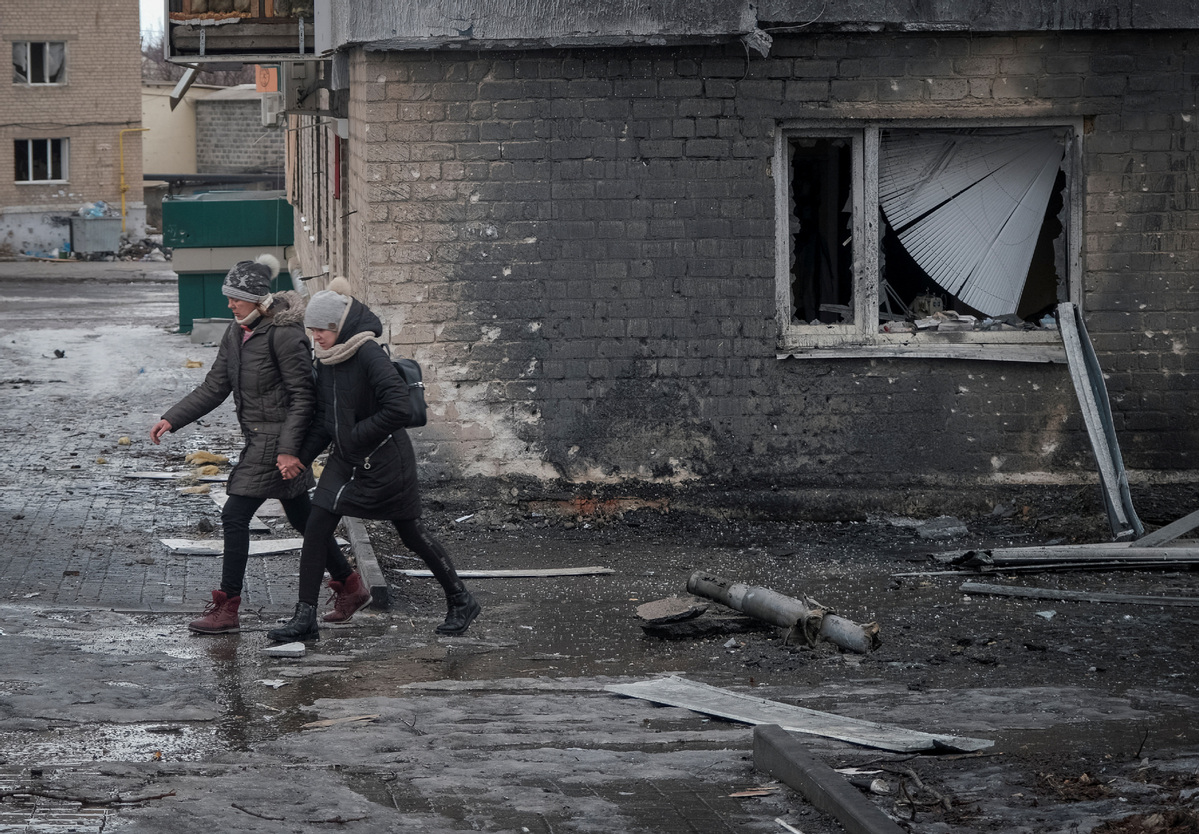
Millions of people are living without electricity during the winter in Ukraine. Millions more have little to no access to heat, clean water and other basic supplies.
The destruction of water sources in particular has left as many as 16 million people without access to clean water or sanitation and at increased risk of water-borne illnesses, according to the International Rescue Committee.
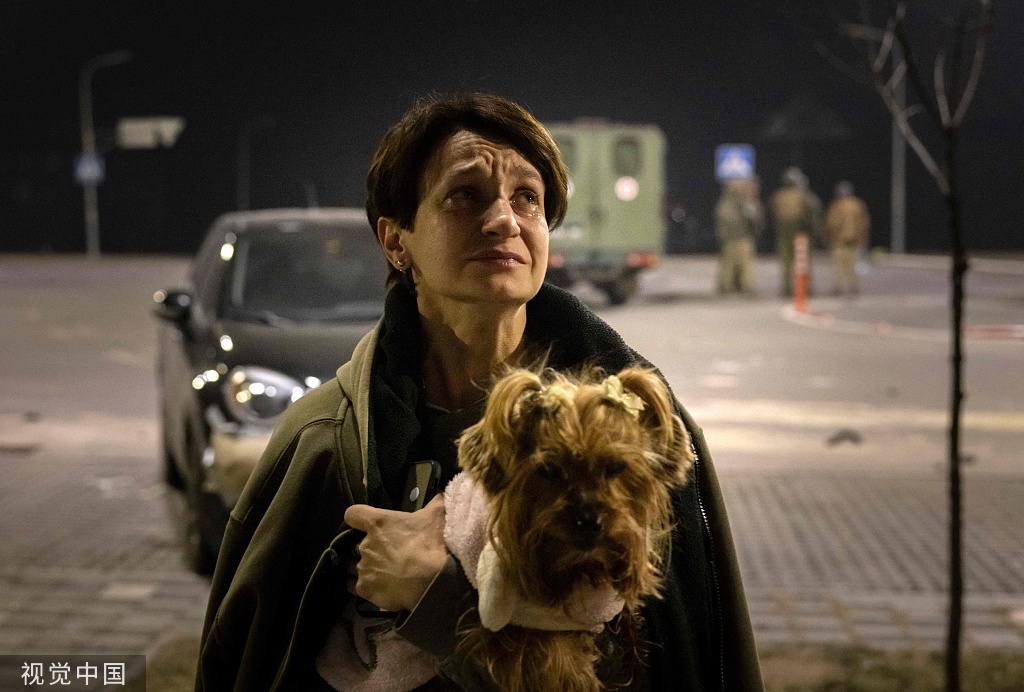
The number of people in need of humanitarian aid and protection increased from approximately 3 million people at the start of the year to nearly 18 million a few months later, according to the United Nations Office for the Coordination of Humanitarian Affairs.
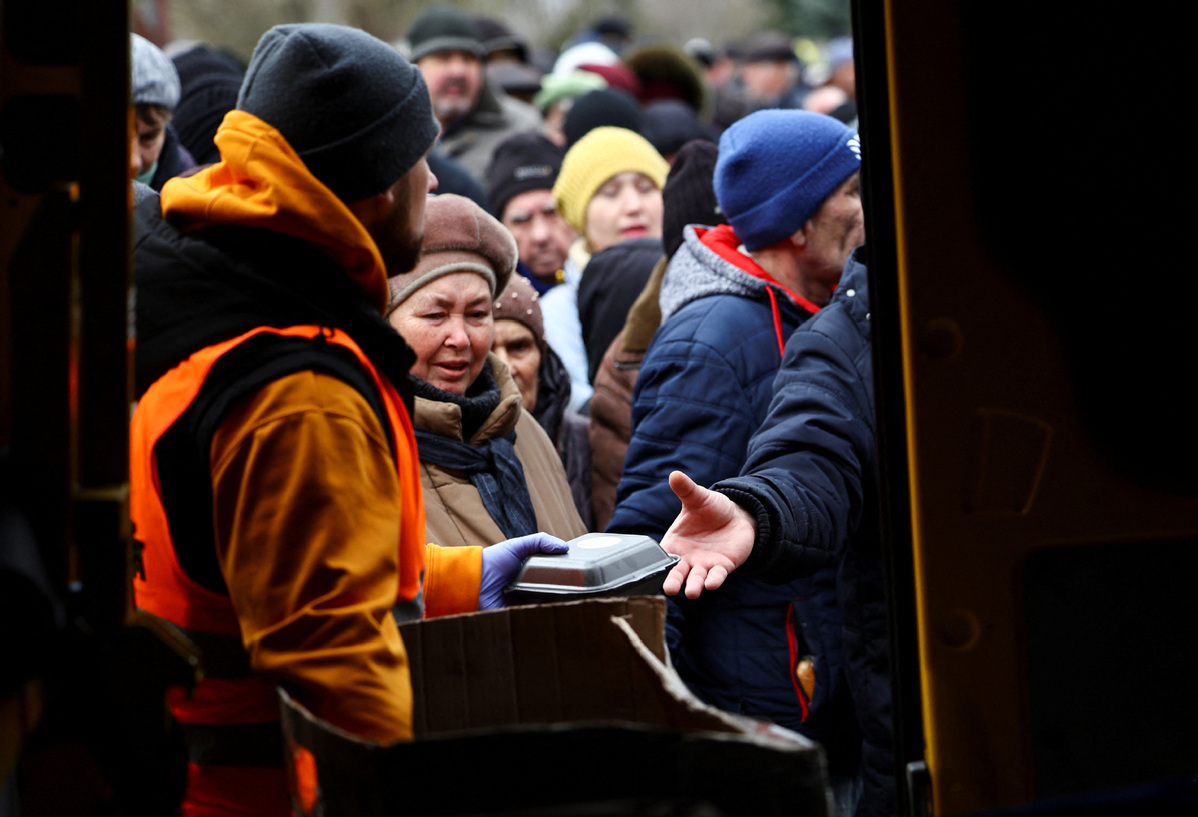
According to the Food and Agriculture Organization of the United Nations, about 205 million people in 45 countries and regions were in a state of food insecurity at the level of "crisis" or more severe in 2022.
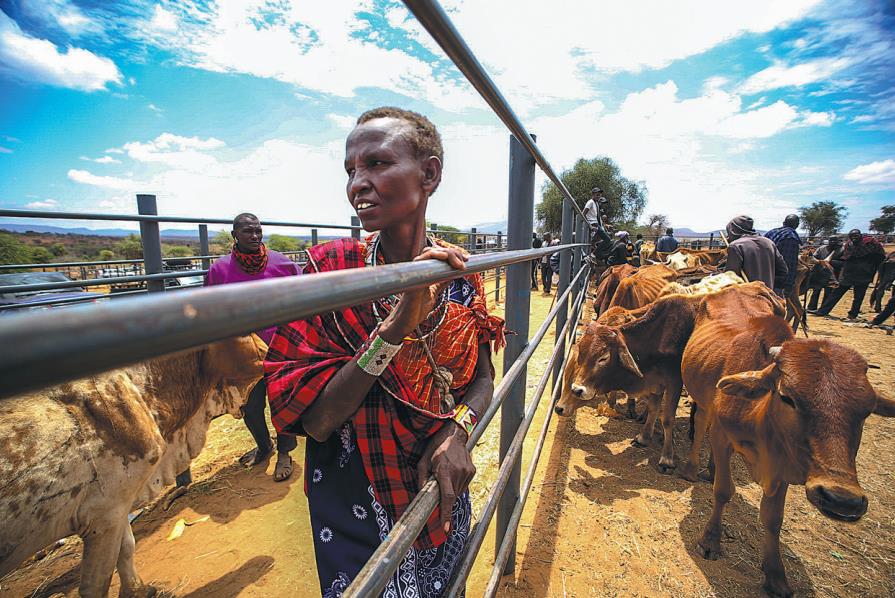
Blockades of Ukrainian grain exports have worsened hunger in some of the world's most vulnerable regions. East Africa is facing a looming famine, 21.7 million people don't have access to sufficient food, and 1.5 million children are at risk of life-threatening malnutrition, according to the International Rescue Committee.
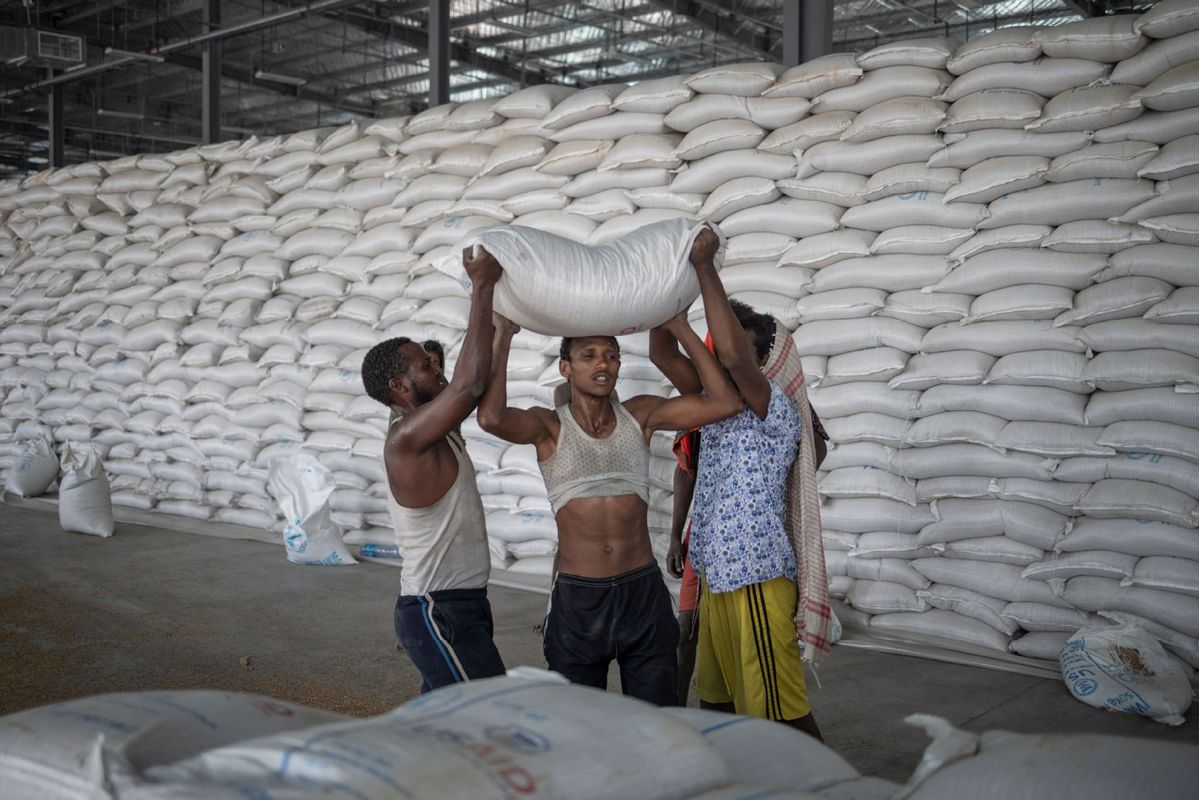
The world's poorest have been affected the most severely. The World Bank estimates 10 million people in the world fall into extreme poverty for every one percent increase in price of food grains.
Since the outbreak of the crisis in Ukraine last year, problems have emerged on all fronts, and the confrontations and conflicts between religions, cultures, and societies have been deepening.
The international community should focus on promoting peace talks, encouraging Russia and Ukraine to return to negotiations, and accumulating conditions of an early cease-fire. Two experts share their views on the issue with China Daily.
Unlike the US’ approach trying to turn the crisis into an indefinite war, China truly promotes peace, said Benyamin Poghosyan,chairman of the Center for Political and Economic Strategic Studies, Yerevan, Armenia.
The conflict between Russia and Ukraine has been going on for a year, and the situation on the battlefield is still at a stalemate.
The largest conflict since the beginning of the 21st century has caused a large number of casualties and incalculable property losses among combatants and civilians on both sides. It also has caused a complex global crisis in the supply chains of energy, food and other commodities, as well as the global industrial chain, severely slowing down the recovery of a world economy already in the doldrums.
At the annual meeting of the World Economic Forum in Davos in January, nearly two-thirds of the chief economists surveyed predicted that the world economy could still be in recession this year.
It goes without saying that an early end to the Russia-Ukraine conflict would serve not only the interests of the two countries and the European region, but also the common interests of all countries in the world. However, due to the fact that Russia and Ukraine have not yet reached a minimum consensus on the conditions for a truce, the United States-led NATO group has been escalating sanctions against Russia and increasing military aid to Ukraine. So the hope of resolving the conflict is very slim.
During the G20 Summit in Bali, Indonesia, in November, leaders of China and the US put up three issues that needed to be seriously considered. First, there are no winners in conflicts; second, there are no simple solutions to complex issues; and third, confrontation between major powers must be avoided. The formation of principled consensus among countries on these three issues is a prerequisite for promoting peace and talks to resolve the Russia-Ukraine conflict.
First, the conflict has brought untold disasters to both countries. It is impossible for either side to achieve a unilateral, complete victory through fights on the battlefield. Moreover, with the increasing intensity of the conflict, it may cause unpredictable spillover risks to Europe and the world at large.
In November, when meeting with visiting German Chancellor Olaf Scholz, President Xi Jinping proposed that the international community should jointly support all efforts to peacefully resolve the Ukraine crisis, oppose the use or threat of use of nuclear weapons, ensure the stability of global industrial and supply chains, and provide winter aid to civilians in areas affected by the crisis. These proposals are in line with the interests of the world and mankind and should become the common principles for the international community in resolving the Russia-Ukraine conflict.
Second, the Ukraine crisis has a complex historical background. It is the result of intensified conflicts in European security and also the product of geopolitical games between major powers. On April 4 last year, while meeting with German and French leaders via video link, President Xi made it clear that the sovereignty and territorial integrity of all countries should be respected, the purposes and principles of the United Nations Charter should be observed, the legitimate security concerns of all countries should be taken seriously, and all efforts conducive to a peaceful settlement of the crisis should be supported.
The unilateral acquisition of absolute security is the ideological root of the tragedy of the conflict between Russia and Ukraine. As an indivisible security community, human society can truly resolve complex international security issues only when guided by a security concept that advocates cooperation and sustainability.
Third, the confrontation between major powers is bound to bring untold disasters to the parties concerned and the whole world, which should be the most profound warning to mankind from the Russia-Ukraine conflict.
It is an old formula of the Cold War mentality to strengthen unity at home and within a group of countries through the way of making foreign enemies. It is actually an act of international hegemony and bullying, which has become increasingly unpopular around the world. It is against this background that Western countries, including the US, have repeatedly said they have no intention of creating a "new Cold War", but meanwhile clearly regard China as their main competitor and Russia as their biggest security threat.
The Russia-Ukraine conflict is the latest proof that making enemies and creating confrontation does not bring sustainable benefits to any country or group of countries.
Friday marks the one-year anniversary of the outbreak of the Russia-Ukraine conflict, and the world is once again at a crossroads in history. It is not clear when the conflict will end, but it is clear that cooperation brings win-win results and conflict creates a lose-lose situation.
Data show that, so far, NATO member states have provided Ukraine with at least $40 billion in military aid, which is equivalent to 25 percent of the country's gross domestic product in 2021. It also means that, in effect, each Ukrainian has received $1,000 in aid, based on a prewar population of 40 million. Unfortunately, instead of benefiting Ukrainians, this aid will turn into weapons that will destroy their homeland.
It is a shame that such a tragedy is happening in the 21st century. All countries should join hands to promote peace talks and bring the world back on the right track of harmonious coexistence and win-win cooperation.
The author is deputy director of the Chinese Academy of Social Sciences' Institute of Russian, Eastern European and Central Asian Studies.
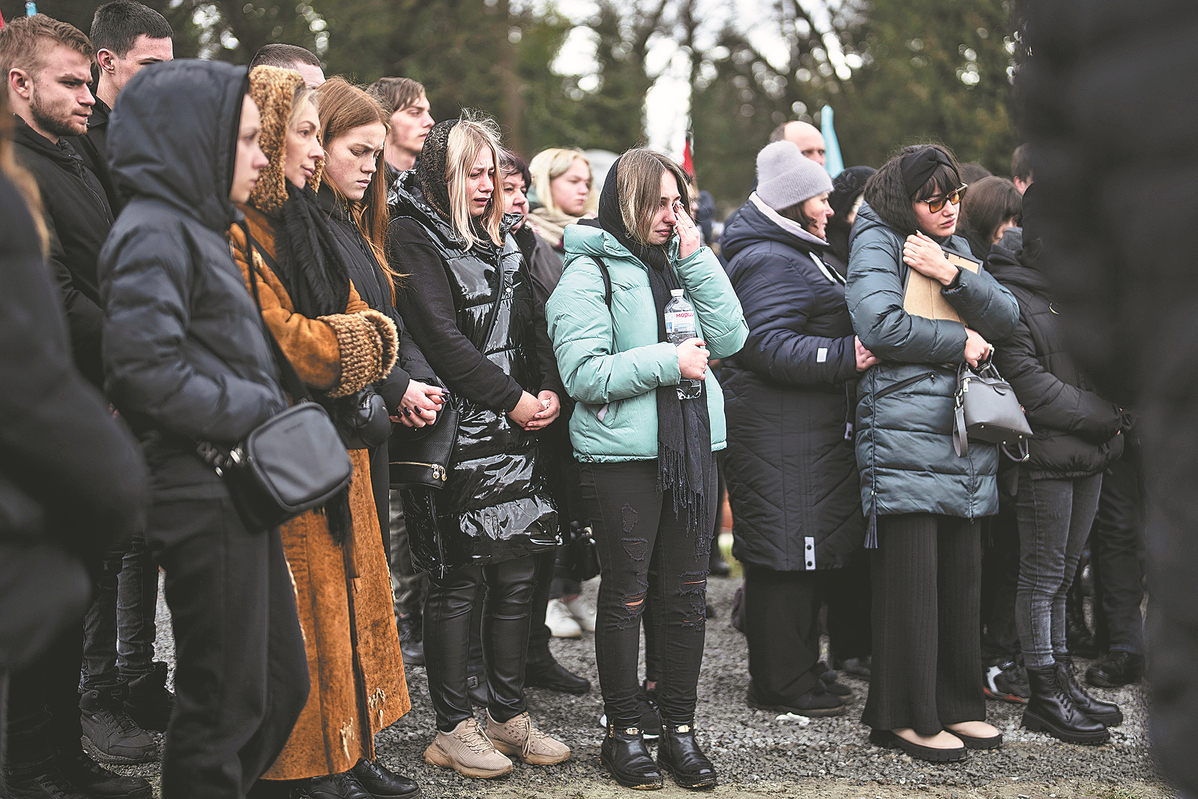
The West and the rest of the world are sharply divided in their views on the Russia-Ukraine conflict and the ensuing global order, according to a survey released on Wednesday by the European Council on Foreign Relations.
Friday marks the one-year anniversary of Russia's special military operation in Ukraine.
The survey was conducted in China, India, Turkiye, the United States, Great Britain, Russia and nine European Union nations.
According to the survey, 65 percent of the respondents in Great Britain, 55 percent in the US and 54 percent in the nine EU nations see Russia as their avowed "adversary". Many people in these countries also agree they should help Ukraine win the conflict.
For 80 percent of the respondents in India, 79 percent in China and 69 percent in Turkiye, Russia is either an "ally" or a "necessary partner".
Also, 54 percent in India, 48 percent in Turkiye and 42 percent in China support a quick end to the crisis.
People in these three countries, as well as in Russia, consider the emergence of a "multipolar world order" more probable than a "bipolar arrangement" between China and the US.
In contrast to opinions in the West, people in many non-Western countries appear to believe that the post-Cold War era is over.
The paradox of the Russia-Ukraine conflict is that "the West is both more united and less influential in the world than ever before", said Mark Leonard, co-founder of the European Council on Foreign Relations and co-author of a report based on the survey.
Emerging powers, such as India and Turkiye, will act on their own terms and resist being caught in a conflict between the US and China, according to Leonard's report.
It said that one of the most striking findings of the survey is that most people, both within and beyond the West, believe the US-led liberal order is coming to an end.
Only 9 percent of the respondents in the US, 7 percent in the EU countries and 4 percent in Great Britain see US global supremacy as the most likely state of affairs a decade from now. Most people in the EU nations and the US expect a bipolar world led by the US and China.
But outside the West, people believe that "fragmentation", not "polarization", will mark the next international order. Respondents in China, India, Turkiye and Russia predict that the West will soon be just one global pole among many. The West may still be the strongest party, but it will not have "hegemonic" control, they believe.
The survey also found that people in China, India and Turkiye are skeptical of the West's claims about defending democracy in Ukraine.
A vast majority of Chinese and Turkish respondents said that the West's support for Ukraine is motivated by reasons other than the defense of Ukraine's territorial integrity or its democracy.
Many in China said the West's support is driven by the desire to protect Western dominance.
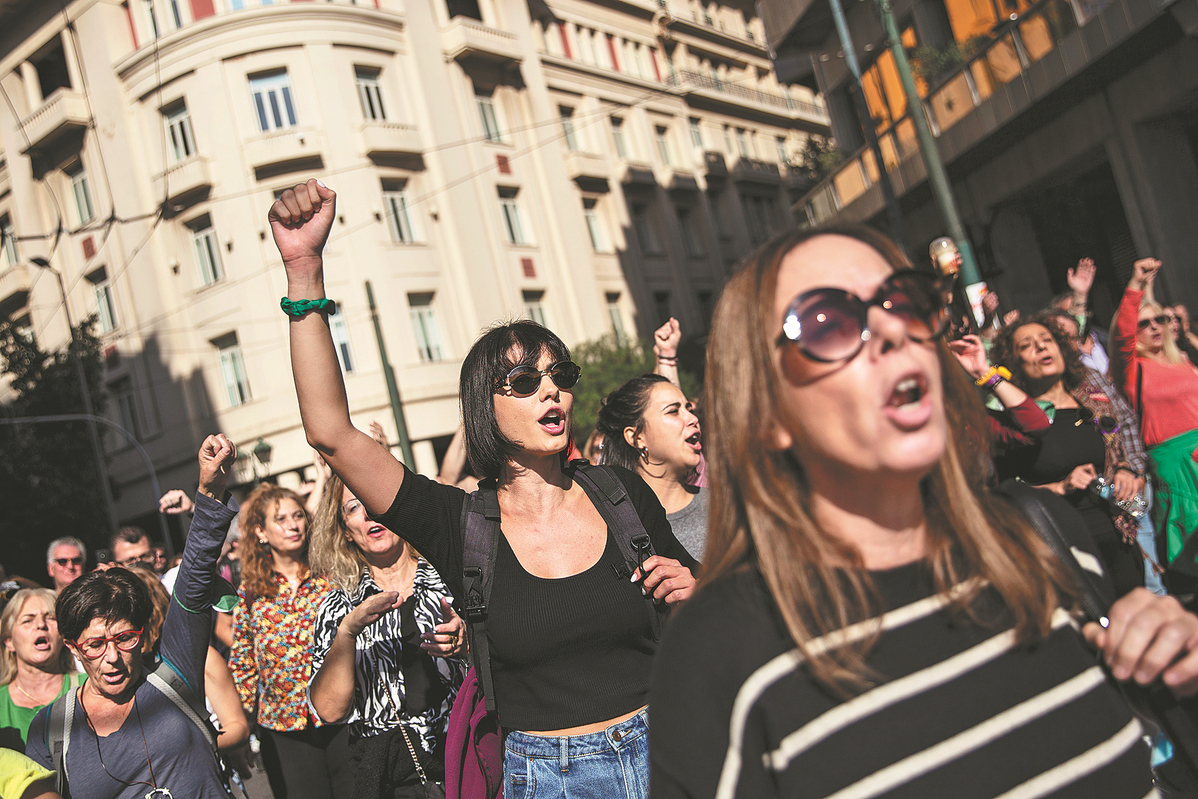
Editor's note: As Feb 24 marks the one-year anniversary of Russia's special military operation in Ukraine, China Daily is reviewing how it has reshaped geopolitics, impacted the global economy and aggravated the energy crisis.
The yearlong conflict between Ukraine and Russia is showing dangerous signs of escalation, evidenced this week by US President Joe Biden's surprise visit, when he pledged to support Kyiv for "as long as it takes".
In their outlooks for 2023, the World Bank and the International Monetary Fund both identified escalation in the conflict as a major downside risk for the global economy, predicting that global growth could decelerate sharply to 1.7 percent and 2.9 percent respectively.
Now 12 months into the conflict, that risk appears to have become a reality on the ground, prompting calls for an early settlement of the issue.
Dan Steinbock, an advocate of the multipolar world and founder of the Difference Group, said the conflict in Ukraine had entered a new, more dangerous phase on Jan 25, with the commitment for some 70 US, German, British and Polish tanks foreshadowing a potentially lethal escalation.
"Not only will economic and human costs climb even further, but strategic risks, including the potential of nuclear confrontation, will soar," Steinbock wrote in an article on the first anniversary of what he called "the unwarranted Ukraine proxy war".
"With such escalation in high-tech arms sales to Ukraine, regional and military spillovers are no longer a matter of principle but a matter of time," he added.
Cal Jillson, a political scientist and historian at Southern Methodist University, Dallas, said that the conflict does not seem poised to end any time soon.
"Its length from here is likely measured in many months, if not years. Given Western support, Ukraine has the will to hold out, and Putin shows no willingness to retreat," he said in an email interview. "Hard to see any real winners here. No peacemakers in sight."
On Monday, Biden made an unannounced visit to Kyiv, promising more military aid and vowing to support Ukraine for "as long as it takes".
"The United States has said repeatedly that we are going to continue what we are doing, which is arming Ukraine for as long as it takes, but we never defined what it is," Chas W. Freeman, former US assistant secretary of defense for international security affairs, told China Daily.
In its Global Economic Prospects report released on Jan 10, the World Bank revised down its 2023 forecasts for 95 percent of advanced economies and nearly 70 percent of emerging market and developing economies, citing concerns including elevated inflation, higher interest rates and disruptions caused by the conflict in Ukraine.
Freeman, now a senior fellow at the Watson Institute for International and Public Affairs, said World Bank predictions, and the IMF's, seem realistic.
"The impact of this (conflict in Ukraine) on the world is too great — food shortages, energy shortages, supply chains being broken, people being killed, people starving. This has to end," Freeman said.
At this point, the most important thing is to find a conflict-termination strategy, have a cease-fire and create a process, perhaps under United Nations supervision, for negotiation of a settlement, Freeman said.
He said resolving the conflict is a delicate diplomatic task that cannot be accomplished quickly.
"But perhaps, if the UN, with the international community acting through the UN, appoints a mediator or a group to mediate this, we can start addressing these two tasks: Ending the war and redesigning European security architecture," Freeman said.
In "Avoiding a Long War: US Policy and the Trajectory of the Russia-Ukraine Conflict", researchers at Rand Corp said global economic disruptions stemming from the crisis will continue and possibly multiply as the conflict goes on.
Energy price rises sharply
The ensuing sharp increase in energy prices has in turn contributed to inflation and slowing economic growth globally, Samuel Charap and Miranda Priebe, senior political scientists at the Rand Corp, wrote in the paper. "Since avoiding a long war is the highest priority after minimizing escalation risks, the United States should take steps that make an end to the conflict over the medium term more likely," they wrote.
The US has already played "many roles" in the Ukraine conflict: guaranteeing that Ukraine will not "lose"; weakening Russia through attrition; and demonstrating resolve to allies and opponents, said Stanley Renshon, a political scientist at the City University of New York.
"The world economy would be better without the war but not by that much. The economic headwinds the world faces go well beyond the Ukraine conflict," Renshon told China Daily.
While in Kyiv, Biden pledged an additional $500 million in US assistance on top of the more than $50 billion already provided. A day before his trip, hundreds of people gathered at the Lincoln Memorial in Washington in an anti-war rally protesting the massive amounts of US funding for Ukraine as well as the US' role in the conflict.
Biden also had a firsthand look at the devastation wrought by the conflict. "The cost that Ukraine has had to bear has been extraordinarily high," Biden said. "And the sacrifices have been far too great."
Douglas Macgregor, a retired US Army colonel and former Pentagon adviser, said "disaster wrapped in rhetoric is not the way to save the people of Ukraine".
"The victims do not live in North America. They live in a region that most Americans can't find on a map. Washington urged the Ukrainians to fight. Now Washington must urge them to stop," he wrote in the article, titled "Washington Is Prolonging Ukraine's Suffering", published on Dec 20.
Related reading
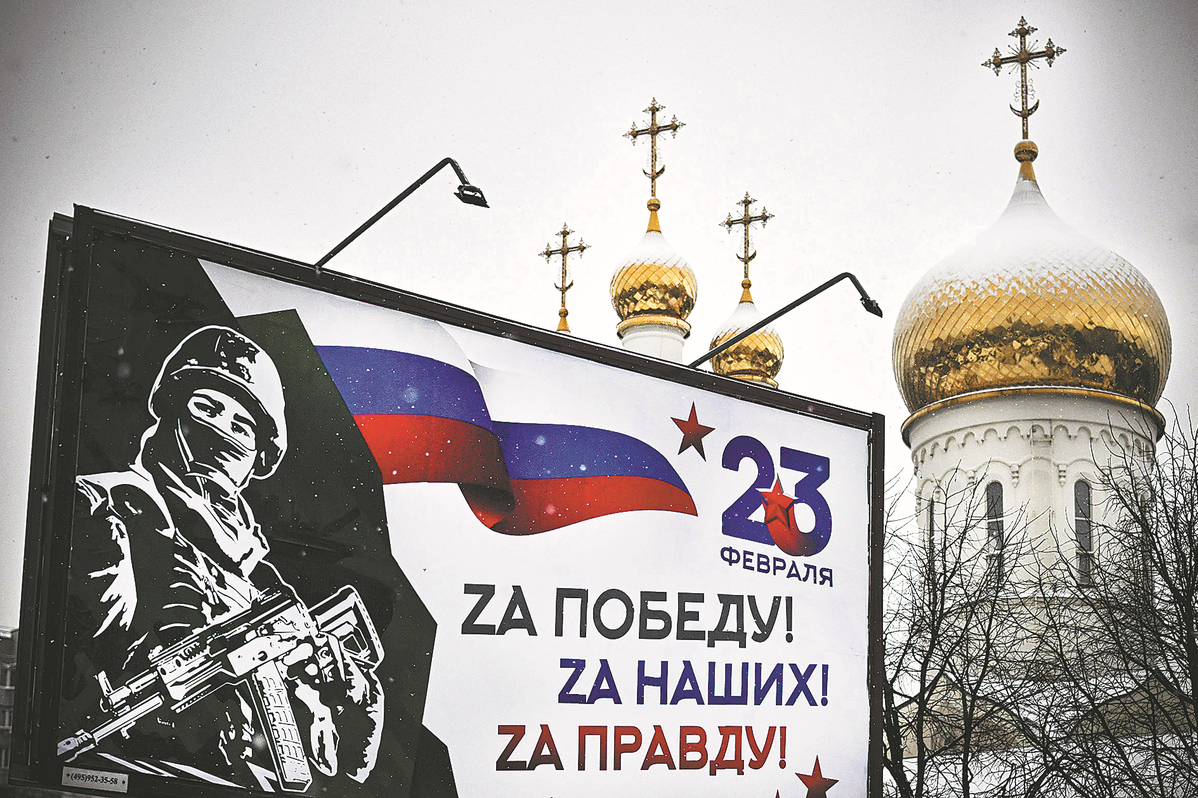
Russia and its people are living under the pressure of what seem like endless sanctions from Western countries, but they are coping with them, President Vladimir Putin says.
He made the remark at a meeting of judges of arbitration, military and common jurisdiction courts on Feb 14.
In the weeks before Russia launched what it called a "special military operation" a year ago, US President Joe Biden attempted to influence events by warning Putin of "economic consequences like none he's ever seen".
The US and its allies have imposed unprecedented economic measures on Moscow. Russia is now the world's most sanctioned country, with more than 5,500 measures aimed against it.
Initially it seemed that sanctions could be devastating for the country; it caused the value of the ruble to slide rapidly, the banking system to shudder and companies worldwide to stop exporting vital goods to Russia.
However, one year later Russia has remained more resilient than many expected, thanks to its oil and gas exports, and deft maneuvering by its central bank and others that has allowed some banned technology to sneak through.
Russia's position looked strong in the early days as the ruble remained strong, even though Western governments had frozen a large portion of the country's hard currency reserves, sanctioned financial institutions and expelled major banks from SWIFT, the international payments system.
There was a risk of a bank run at the beginning of the conflict and shortly after the sanctions were imposed, said Alexandra Prokopenko, at the time an adviser to the Russian central bank's first deputy chairwoman, now living in exile in the West.
The steps sparked financial panic, prompting lines at bank machines as people feared the ruble would crash and result in a cash shortage.
The measures banned companies globally from selling Russian computer chips and other high-tech goods the country needed to build weapons and military vehicles.
They also severed so many banking links that Russian importers had trouble paying overseas counterparts. By April Russia's imports were 43 percent below prewar levels, a recent report by the think tank Silverado Policy Accelerator in Washington said.
However, quick countermeasures by Russia's central bank soon restored a measure of stability. Officials closed down stock markets, forced the main interest rate to 20 percent, and imposed restrictions on currency exchange, withdrawals and hard-currency transfers overseas. The measures reversed the ruble's slide.
Janis Kluge, an economist at the German Institute for International and Security Affairs in Berlin, forecasts that Russia's budget deficit could reach 5 percent of GDP this year, compared with 2 percent last year, due to the drop in energy exports and the rapidly falling tax take from the declining economy.
On Thursday the European Bank for Reconstruction and Development lowered its forecast for Russia's economic growth this year to 3.5 percent but maintained its forecast for a 3 percent decline in GDP this year.
Forecasts for Russia's economic growth outlook have become a matter of contention after the International Monetary Fund forecast this month that the country's economy would grow 0.3 percent — faster than that of both Germany and the UK.
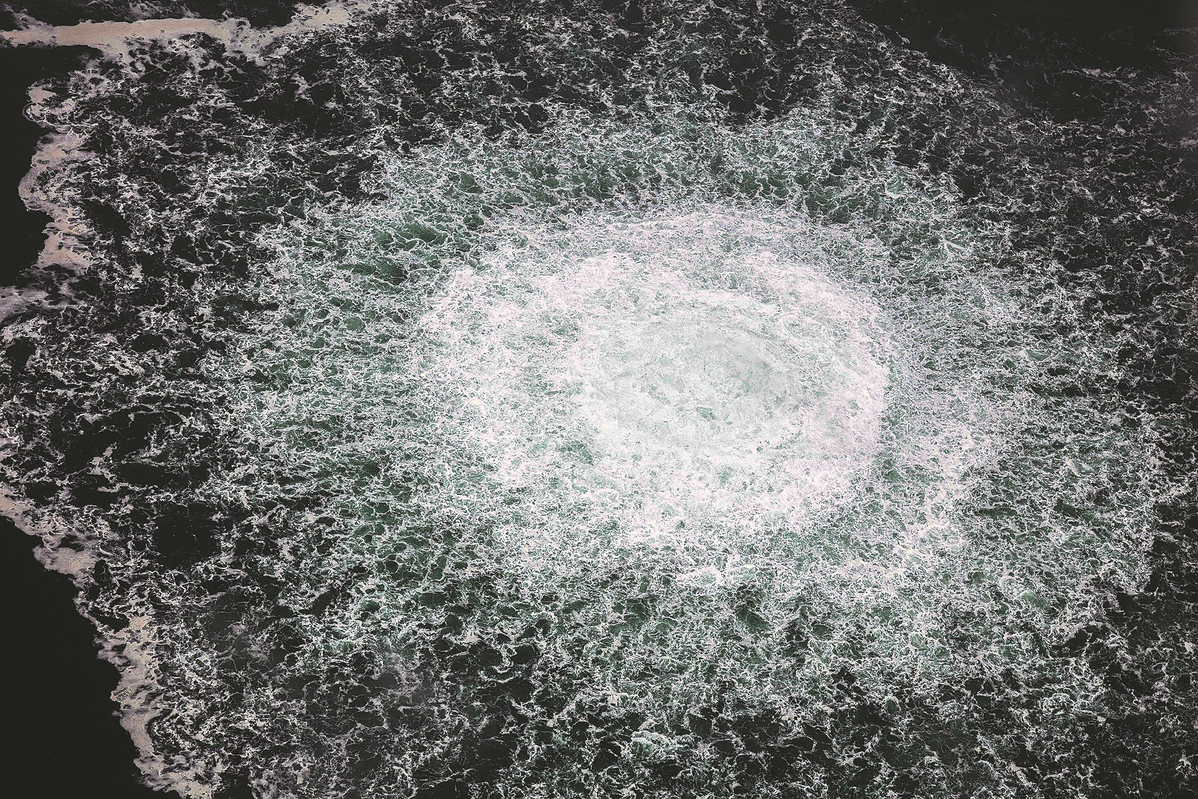
Weeks after the US investigative journalist Seymour Hersh said in a report that the United States Navy was involved in the Nord Stream explosions last year, Western mainstream media have remained largely silent, let alone done follow-up reports, experts say.
This, they say, demonstrates the hypocrisy and bias of Western news coverage.
Hersh, a Pulitzer Prize winner renowned in particular for uncovering the My Lai Massacre during the Vietnam War, wrote on the US portal Substack on Feb 8 that the Nord Steam pipelines attacks were orchestrated by the White House. The US Navy and the CIA were also involved, he said, citing an unnamed source.
If true, it could be "a terrorist act" committed by the US government against vital German infrastructure, Stephan Ossenkopp, a German scholar with the think tank Schiller Institute, told CGTN.
The US has dismissed Hersh's allegations as "utterly false and complete fiction". Denmark, Germany and Sweden said on Tuesday that blast inquiries have not yet concluded. Russia has called a United Nations Security Council meeting over the attacks.
US mainstream media have by and large remained silent on Hersh's claims. A week after the revelation, US online news portal Mint-Press reported that the 20 most influential news publications in the US, including CNN, The Wall Street Journal and The Washington Post, have essentially disregarded Hersh's story. Four media outlets gave scant attention to it, such as a report of 100 words or so by Bloomberg.
European outlets including the BBC, The Guardian and most German newspapers have ignored it, the Washington-based online magazine Responsible Statecraft said on Feb 16.
Hersh told the US broadcast Democracy Now!, published on Feb 15, that "I wasn't even thinking of taking a story like this to The New York Times", which he had worked for.
Western mainstream media "intentionally ignores" Hersh's report, said Ding Yifan, a research fellow at the Development Research Center of the State Council's Institute of World Development in Beijing.
"Any story that goes beyond their values and stance will not be published," Ding said. "Misinformation, or even disinformation, abounds in Western media, which is part of their public opinion war, or propaganda war. These are their tactics."
Responsible Statecraft quoted Mark Ames, who interviewed Hersh on the US Radio War Nerd program on Feb 11, as saying: "The corporate media is ignoring Hersh's story because they're deeply invested in the US empire and don't like stories that make the US empire look bad."
However, European media were "caught in a dilemma" on this matter, said Wang Zhen, a research professor of international politics at the Institute of China Studies, Shanghai Academy of Social Sciences.
"Dramatizing the issue will only make Europe, especially Germany, look awkward."
'Biased' coverage
The Russia-Ukraine conflict has been politicized in the US, Wang said, pointing to "one-sided and biased" news coverage. "Westernled media are intentionally amplifying any information that is unfavorable to Russia, but disseminating news favorable to Ukraine."
The West simply uses the media as a tool to serve their purpose in geopolitical wrestling, Ding said.
Early in the Russia-Ukraine conflict the West imposed economic and political sanctions on Russia, and Russian media organizations such as RT and Sputnik were targeted.
"Western media proclaim that they support freedom of speech and being impartial in their reporting, but this is total self-deception," Wang said, echoing Ding's view.
China's Foreign Ministry spokesman Wang Wenbin said on Monday that the Nord Stream pipeline explosions dealt a severe blow to the global energy market and the global natural environment. An objective, impartial and professional investigation into the explosions is called for, he said.
